- Home
- Ann M. Martin
The Long Way Home
The Long Way Home Read online
Contents
Title Page
Dedication
Chapter 1
Chapter 2
Chapter 3
Chapter 4
Chapter 5
Chapter 6
Chapter 7
Chapter 8
Chapter 9
Chapter 10
Chapter 11
Chapter 12
Chapter 13
Chapter 14
Chapter 15
Chapter 16
Chapter 17
Chapter 18
Chapter 19
Epilogue
About the Author
Also by Ann M. Martin
Copyright
The smells drifting through the wide-open window of Dana Burley’s bedroom weren’t exactly pleasant, but they weren’t exactly unpleasant either. She sniffed cautiously. Garbage truck, for sure. She had heard the grinding of gears and the rattle of metal cans and the calls of Howard and Arnold, who got to ride around all day long on the back of the truck, hanging on with just one hand and leaning merrily out into traffic. She sniffed again. She could smell exhaust, too, from the cars and taxis that rumbled along Eleventh Street, but mixed with everything else was the scent of leaves from the maple tree outside her window, and, drifting up from downstairs, various cooking smells — coffee and eggs and something sweet, which might be a birthday cake.
From across the room, as if she had read Dana’s mind (and she probably had), Julia said, “I think I smell our birthday cake.”
Dana pretended she was still asleep.
“Dana? I know you’re awake.”
This was one of the problems with having a twin sister. Dana had no secrets from her. Well, hardly any. She rolled over and looked across the room at Julia.
“We’re seven today!” exclaimed Julia. “Aren’t you excited?”
Dana grinned. “Yes.”
“How come you didn’t answer me before?”
Dana shrugged beneath her cotton blanket, then tossed it back. She sat up in bed and looked out the window just in time to see the garbage truck disappear from view, Howard waving to Mrs. Morgan, who was walking her poodle to the corner. Dana turned and surveyed the bedroom she shared with Julia. She thought of a word her art teacher had recently explained: symmetry. Her room certainly was symmetrical. You could see, on one side, Dana’s domain, and on the other side, the reverse image, as if someone had held a mirror up to Dana’s things. This was because every time Dana added something to her side, Julia hurried to add the same thing to the other side. If Dana asked her mother to look for a blue spread for her bed, Julia begged for the same blue spread. If Dana began a collection of marbles and arranged them in a tray on her bookcase, then — surprise, surprise — Julia suddenly became interested in marbles and arranged them on her bookcase on the opposite wall.
Even worse, most mornings, Julia waited until Dana had gotten dressed and then put on the exact same outfit.
“We’re too old for samesies,” Dana had said over and over again.
“But we’re twins. Identical twins. We’re special,” Julia had replied.
“Mommy, she’s copying me!” Dana would complain to their mother, and Abby would say patiently, “She looks up to you. She just wants to be like you, lovey. You should be flattered.”
Dana was, after all, nine minutes older than Julia.
“Hi,” came a husky voice from the doorway.
Dana patted her bed, and her brother ran across the room and dove onto her pillows. Then he sat placidly next to Dana, his eyes flat, his mouth hanging open slightly. “It’s your birthday,” he said seriously. Actually, what he said was, “It your birfday.”
“That’s right!” cried Julia, rolling out of her own bed and joining Dana and Peter. “You remembered. Do you know how old we are?”
“Five?” guessed Peter. His tongue protruded from his mouth and he breathed heavily.
“No, you’re five,” said Dana. She didn’t want to hurt his feelings, though, so she added, “But that was a good guess.”
“Party?” asked Peter.
“Yup, there’s a party today, and a magician is —”
“Cake?” Peter interrupted.
“Yes, there will be cake,” said Julia.
“I like cake,” Peter announced.
“We know you do,” said Dana. “Come on. Let’s go downstairs. But first, do you need to use the potty?”
Peter didn’t answer and Dana hurried into his room, pulled back the covers, and saw the wet stain on the sheets. Potty training was not going well.
“Do you need a diaper today?” asked Dana as she handed her brother a fresh pair of pajama bottoms.
Peter stepped into them and headed for the stairs. “I don’t know.”
Dana passed him. Then, followed by her sister and brother, she hurtled down the stairs to the second floor, ran by their parents’ bedroom, and hurtled down another flight of stairs, jumping over the last two steps to make a dramatic entrance in the hallway.
“Are those the birthday girls?” their father called from the kitchen.
“Yes!” cried Dana and Julia, making their breathless way to the breakfast table.
“And me!” said Peter.
“And you,” agreed Zander Burley, pulling Peter into his lap. He looked at the twins. “My goodness. Seven years old. What do you suppose is going to happen to you girls this year?”
Dana slid into her place at the table and watched her mother drop orange halves in the juicer and pump the arm up and down, juice flowing out the other side into a glass.
“Well,” said Dana slowly, “I’m going to start second grade.”
“We’re going to start second grade,” said Julia pointedly.
“And I’m going to keep taking art lessons with Mrs. Booth.” Dana glanced at her sister. This was one claim that Julia couldn’t make. She had no interest in art.
Abby turned away from the juicer and bent to kiss each of her children on the head. “Happy birthday,” she said to Dana. “Happy birthday,” she said to Julia. “Good morning, lovey,” she said to Peter.
“Presents!” Peter shouted suddenly.
Dana’s mother smiled. “Peter knows where your birthday presents are hidden.”
“Ooh, can we open them now?” asked Julia. “Please?”
Dana stared out the window at the garden behind their town house.
“Don’t you want to open our presents now?” Julia prodded her.
Dana hesitated. “I didn’t ask for anything.”
“Well, you know you’re getting presents anyhow,” said Julia.
Dana continued to study the garden.
Her father eyed her from across the table. “Is there something you haven’t told us?”
Dana picked up her spoon and saw her warped reflection in it. “There is one thing I want, but it isn’t something you can buy.”
Now everyone was staring at her.
“I get the presents?” said Peter, heading for the door.
No one answered him.
“Dana? Lovey?” said her mother.
“I want my own room,” Dana whispered.
Julia opened her mouth and then closed it again.
“Please?” said Dana. “I know you think Julia and I want to share a room.”
“We do!” exclaimed Julia. “We do!”
“You do. But I don’t. I don’t want everything to be samesies. I want to be just myself in my own room. We could turn the den into my room. Please?” Dana said again. “It’s right next to our bedroom, Julia, so we’d be next door to each other.”
“No!”
“We already have a library downstairs, and, Daddy, you have your study on the top floor, so it isn’t like we need a den. It
could be my room, my very own room.”
Dana saw her parents exchange a glance over her head. She had long ago realized that Abby and Zander could talk to each other with just their eyes. That was how close they were. They had known each other since grade school, which was a long time. True, they had become separated when Zander had gone off to fight in World War II, but after he had come home, he’d tracked Abby down in New York City and proposed to her (for the second time). Now they had been together for ten years, and seemed, to Dana, to live secret, impenetrable lives.
“This is something Daddy and I need to discuss, lovey,” Abby said to Dana. “We’re not saying no. We just need to talk about it.”
“And we might not have a chance to talk about it today,” said Zander. “Too much going on. We have party preparations this morning —”
“Cake!” cried Peter, who had returned, presentless, to the table.
“Yes, cake,” his father repeated fondly. “And then there’s the party this afternoon and your special evening tonight.”
Dana’s thoughts, ever since she had begun to eye the den as her future bedroom, had not been on her birthday, but now she began to feel excited. “Pockets the Clown will be here, Peter! Remember Pockets? He came to your fourth birthday party.” She turned to her parents. “Thank you,” she said. To Julia she added, “You’ll have your own room, too, you know. Won’t that be great? You can have privacy and —”
“I just want you,” muttered her sister.
“Now I get the presents?” said Peter, heading for the door again. And when he returned with an armload of wrapped packages, Julia brightened. She said no more about Dana’s birthday wish.
* * *
Dana’s mother had worried that the day would be rainy or that a thunderstorm would come along in the afternoon. She wanted to be able to hold the party in the garden, although Dana didn’t see why they couldn’t have the party indoors, since their town house was enormous. But the sun shone all day long, and Dana and her family and the twelve guests were entertained in the bright, humid July air of a New York afternoon by Pockets the Clown and Sinbad the Magician. Peter wore a suit and tie and his new brown oxfords, and Dana and Julia wore party dresses that stood out stiffly with crinoline. (Julia had waited to see which dress Dana would wear and had selected the matching one, and then Dana had secretly changed into a different party dress when it was too late for Julia to do anything about it.)
In the garden Dana sat surrounded by her four best friends, holding hands with her two best best friends, until Julia unhitched Marian Hackenburg’s hand from Dana’s and replaced it with her own. The guests watched, fascinated, as Pockets pulled twenty-five American flags from a pocket the size of a postage stamp, and then pulled fifteen gumdrops from an equally small pocket and passed them out to the children. Later they watched Sinbad turn a bottle of milk into a dove, and make a rose disappear . . . only to turn up later in Peter’s ear. This came as no surprise to Peter, who simply smiled vaguely. Dana realized that this was because Peter didn’t understand enough to know that a rose shouldn’t be in his ear in the first place, but everyone else was amazed and clapped loudly for Sinbad when the show was over.
Later there was ice cream and cake, and before the twins opened the presents from their friends, they all took turns whacking a stick at a donkey-shaped piñata that Dana’s father had hung from a limb of the gingko tree. Marian was the one whose crashing blow finally broke the piñata open, and then everyone scrambled to gather up the candies and trinkets. Patty Morris gave all of her candy to Peter.
The party ended, the guests went home, and Dana was in the garden examining her presents — pleased that several of her friends had chosen not to get identical gifts for her and Julia — when her mother called from the back door, “Girls, time to get ready for tonight. I think you’ll both need baths before you put on fresh clothes.”
* * *
Peter’s babysitter arrived at five thirty.
“Can’t Peter come with us, Daddy?” asked Dana.
“He isn’t quite old enough for Plain and Fancy,” said her father. “He’d get too wiggly. Remember how wiggly he was the last time we went to the theatre? We’ll do something fun together on the weekend.”
“How about tomorrow?”
“Tomorrow is Friday. I already took one day off from writing. I need to get back to work. The book is due in a month. Now go change! Our chariot awaits.”
The chariot was not a chariot and it wasn’t waiting. It was a cab the Burleys caught at the corner of Eleventh Street and Sixth Avenue, and it drove them to the 21 Club for a very grown-up dinner before they walked to the Winter Garden Theatre, where Plain and Fancy was playing.
“This certainly is different from the birthdays I used to have,” said Dana’s mother as they settled into their seats in the theatre.
“You didn’t go to any musicals?” asked Julia.
“Your daddy and I lived in a very small town in Maine. There was only one theatre and it was a movie theatre. And when I was little, we hardly had any money. I didn’t even have a birthday party until I was eleven. Then we had a picnic on the beach. I thought it was very grand.”
“A picnic? That was all?” said Dana.
“Well, it was a very nice picnic and lots of people came. And your aunt Rose and I got new dresses.”
“Were you there, Daddy?”
“I was. But I hardly knew your mother then. I already liked her, though,” he said, and reached across Dana’s lap to take Abby’s hand.
“Don’t kiss her!” Dana hissed, and Julia giggled. “Not in public!”
The lights dimmed then, the orchestra began to play, and Dana settled in her seat, her eyes on the stage as the curtain rose.
She felt quite grown-up, having eaten dinner at the 21 Club, and sitting now in the Winter Garden, surrounded by dressed-up theatergoers, mostly adults. She had a feeling that this year was going to be very different from any year before.
The best thing about catching the flu (and there actually had been several good things about it) was that during the long days her mother had confined Dana to bed, Dana had made a vast number of Christmas decorations for her room. Looped over her window was a string of gold and silver stars, and in the center of each, Dana had drawn a different illustration from “The Twelve Days of Christmas” — a French hen (even though she had no idea what a French hen was), a leaping lord, a milkmaid — trying to remember everything she’d learned from Mrs. Booth, her art teacher. Taped to her closet door was a paper tree, and dangling from its boughs were individual paper ornaments. At the top of the tree was an angel with yellow yarn for her hair and tiny brown buttons for her eyes. And draped everywhere — swooping from the ceiling, trailing from bedpost to bedpost, connecting lamp to bookshelf to doorknob — were green-and-red paper chains, the links held together with goopy paste, just like the paste Dana and Julia used in their second-grade room at Miss Fine’s School.
Now the flu was gone, although Dana was still coughing (so were Julia and Peter), but the wondrous decorations remained. And, Dana noted with some satisfaction, Julia hadn’t even begun to try to make similar ones for her room. The days of samesies were fading.
Dana glanced out the window of her new bedroom, saw snowflakes falling lightly onto the softened world of Eleventh Street, and tiptoed into the hallway. The doors to Julia’s and Peter’s rooms were still closed, but from the first floor came low voices. Dana started down the stairs, reached the second floor, and listened again. Her mother’s voice was raised slightly; her father’s sounded tired, as if he had been explaining something over and over again. Or maybe defending himself.
“Could you just please confine it to the evening after the children have gone to bed?” said her mother sharply.
“Don’t make rules for me, Abigail,” her father replied.
Dana’s mother said something else, which Dana couldn’t catch, and then her father said, “I didn’t think it was so important.”
; “Well, it is. It’s —”
Her mother stopped speaking as Dana suddenly ran full tilt down the last flight of stairs and burst into the kitchen. “Good morning!” she said brightly.
Her parents looked up from their coffee. In the lull that followed, Dana became aware that the radio was on and caught the words Rosa Parks and then the words bus boycott.
“Rosa Parks did a very courageous thing,” her father said into the awkward atmosphere of the kitchen.
Dana nodded. “She’s the Negro lady who refused to give up her seat on the bus just so a white person could sit down instead,” she said, pleased with her knowledge. “But then they made her pay a fine!” she added indignantly. “That wasn’t right.”
“It certainly wasn’t,” agreed her mother.
Dana’s parents loosened their grips on their coffee cups. They looked at each other and held one of their eye conversations. Even Dana could understand this one. Their argument, whatever it had been about, would be continued later, in private.
“It’s important to stand up for what you believe in,” said Abby.
“And to think of the other person,” said Zander. “Apparently, the white people on the bus didn’t stop to think that Rosa Parks might need to sit down after a long day at work.”
“Always be nice,” added Dana.
She thought of the little boy who had laughed and pointed at Peter in the grocery store the day before and wondered if Peter remembered this. With Peter, it was hard to tell.
Dana’s mother switched off the radio and opened the Frigidaire. “Breakfast time,” she announced.
And Dana said, “Daddy, can we get the Christmas decorations out today?”
* * *
The decorations were kept in large cardboard boxes stored in the closet shaped like a triangle underneath the staircase to the third floor. For eleven months out of every year, the boxes sat in the dark in forlorn, musty stacks. Sometimes Dana peeked in at them on a sweltering summer day, just to see how they were doing. But early each December, her father hauled the boxes out and carried them to the first floor. This was one of Dana’s favorite days of the year, almost as good as Christmas Day itself.
That morning, the snow still falling, Dana and Julia and Peter opened carton after carton and exclaimed over all the things they hadn’t seen since the previous January, when the decorations had been put away.

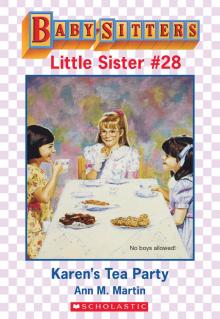 Karen's Tea Party
Karen's Tea Party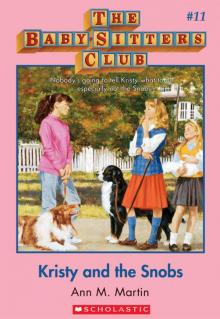 Kristy and the Snobs
Kristy and the Snobs Best Kept Secret
Best Kept Secret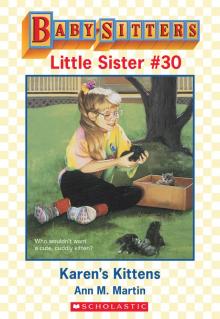 Karen's Kittens
Karen's Kittens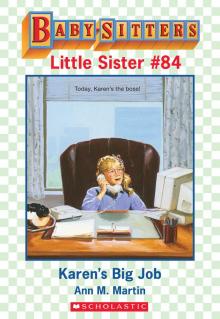 Karen's Big Job
Karen's Big Job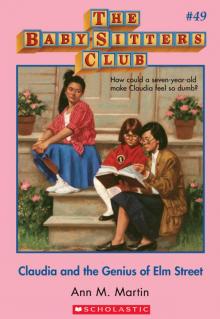 Claudia and the Genius of Elm Street
Claudia and the Genius of Elm Street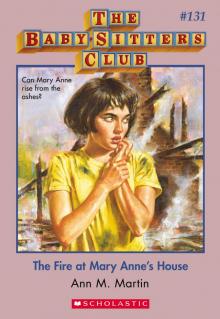 The Fire at Mary Anne's House
The Fire at Mary Anne's House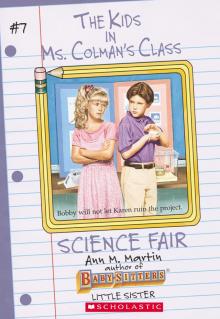 Science Fair
Science Fair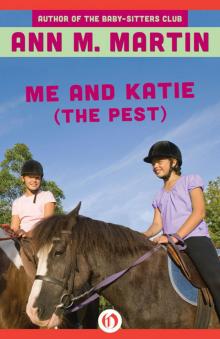 Me and Katie (The Pest)
Me and Katie (The Pest)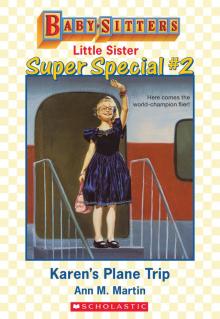 Karen's Plane Trip
Karen's Plane Trip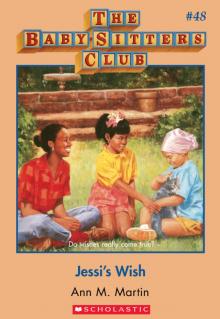 Jessi's Wish
Jessi's Wish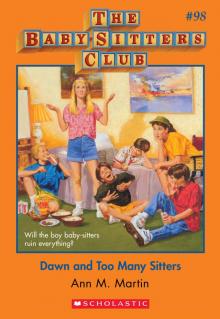 Dawn and Too Many Sitters
Dawn and Too Many Sitters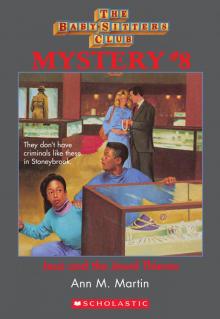 Jessi and the Jewel Thieves
Jessi and the Jewel Thieves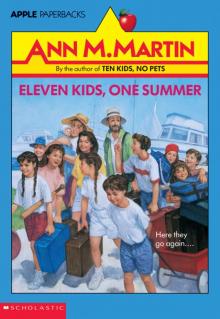 Eleven Kids, One Summer
Eleven Kids, One Summer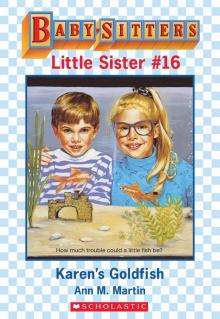 Karen's Goldfish
Karen's Goldfish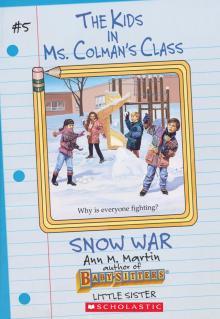 Snow War
Snow War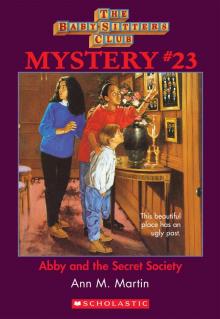 Abby and the Secret Society
Abby and the Secret Society Keeping Secrets
Keeping Secrets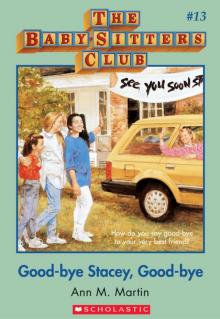 Good-Bye Stacey, Good-Bye
Good-Bye Stacey, Good-Bye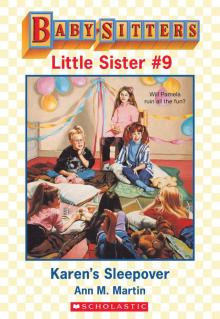 Karen's Sleepover
Karen's Sleepover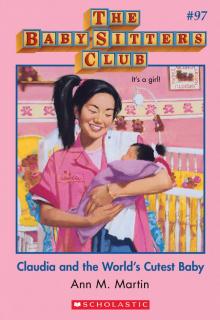 Claudia and the World's Cutest Baby
Claudia and the World's Cutest Baby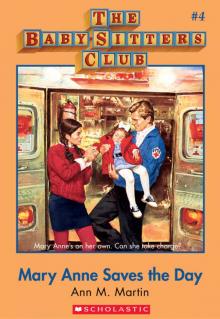 Mary Anne Saves the Day
Mary Anne Saves the Day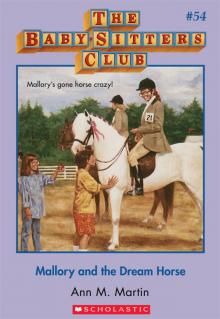 Mallory and the Dream Horse
Mallory and the Dream Horse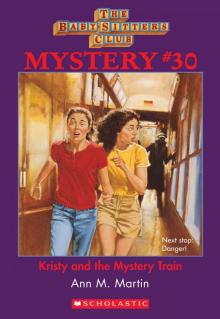 Kristy and the Mystery Train
Kristy and the Mystery Train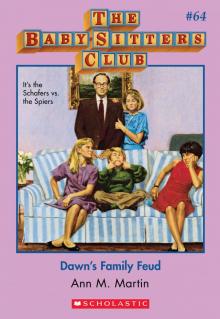 Dawn's Family Feud
Dawn's Family Feud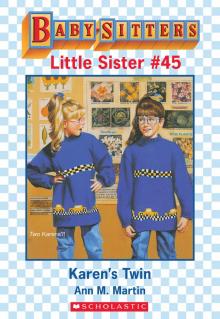 Karen's Twin
Karen's Twin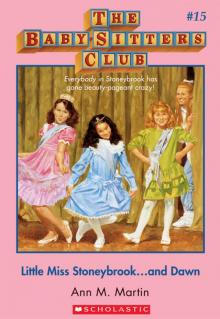 Little Miss Stoneybrook... And Dawn
Little Miss Stoneybrook... And Dawn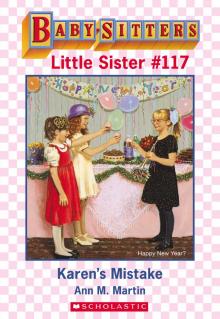 Karen's Mistake
Karen's Mistake Karen's Movie Star
Karen's Movie Star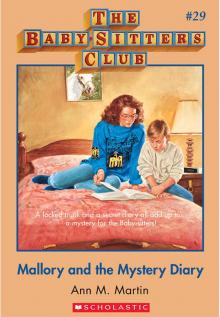 Mallory and the Mystery Diary
Mallory and the Mystery Diary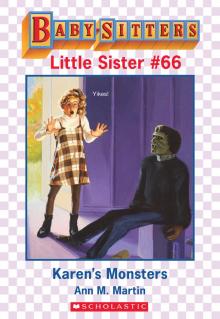 Karen's Monsters
Karen's Monsters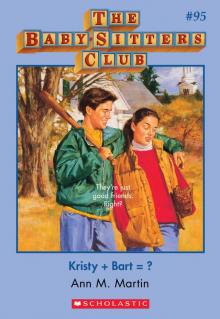 Kristy + Bart = ?
Kristy + Bart = ?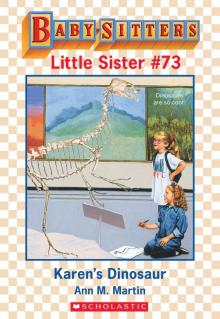 Karen's Dinosaur
Karen's Dinosaur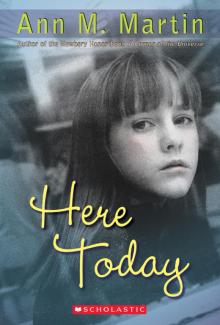 Here Today
Here Today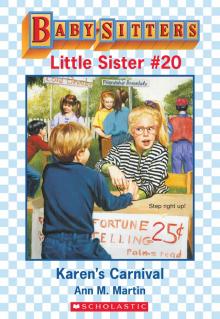 Karen's Carnival
Karen's Carnival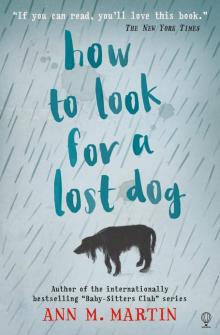 How to Look for a Lost Dog
How to Look for a Lost Dog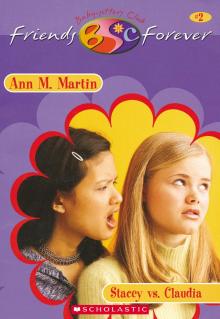 Stacey vs. Claudia
Stacey vs. Claudia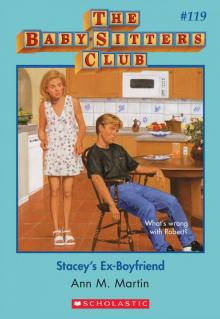 Stacey's Ex-Boyfriend
Stacey's Ex-Boyfriend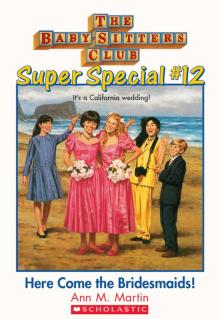 Here Come the Bridesmaids!
Here Come the Bridesmaids! Graduation Day
Graduation Day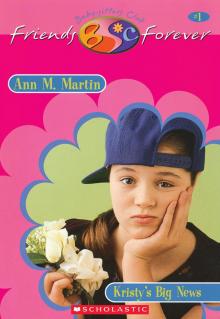 Kristy's Big News
Kristy's Big News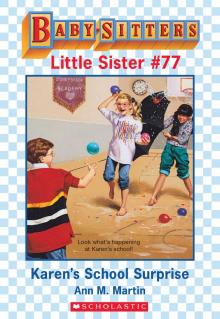 Karen's School Surprise
Karen's School Surprise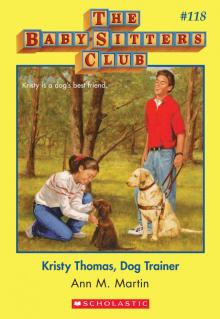 Kristy Thomas, Dog Trainer
Kristy Thomas, Dog Trainer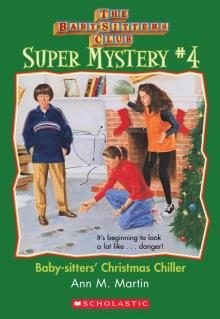 Baby-Sitters' Christmas Chiller
Baby-Sitters' Christmas Chiller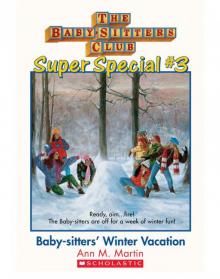 Baby-Sitters' Winter Vacation
Baby-Sitters' Winter Vacation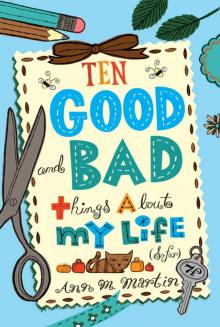 Ten Good and Bad Things About My Life
Ten Good and Bad Things About My Life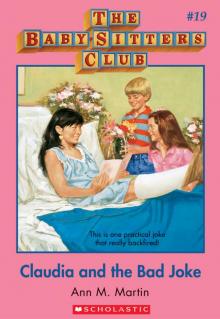 Claudia and the Bad Joke
Claudia and the Bad Joke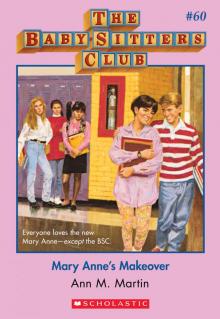 Mary Anne's Makeover
Mary Anne's Makeover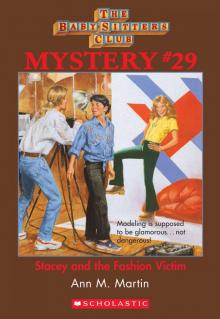 Stacey and the Fashion Victim
Stacey and the Fashion Victim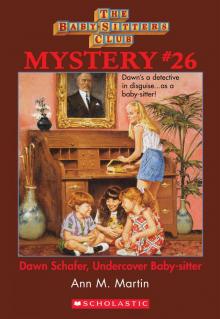 Dawn Schafer, Undercover Baby-Sitter
Dawn Schafer, Undercover Baby-Sitter Karen's Tuba
Karen's Tuba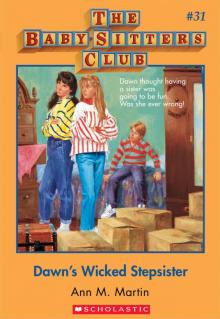 Dawn's Wicked Stepsister
Dawn's Wicked Stepsister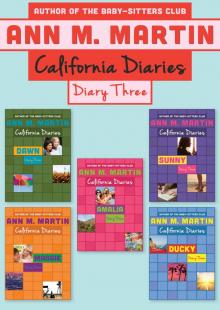 Diary Three: Dawn, Sunny, Maggie, Amalia, and Ducky
Diary Three: Dawn, Sunny, Maggie, Amalia, and Ducky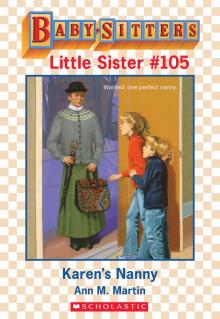 Karen's Nanny
Karen's Nanny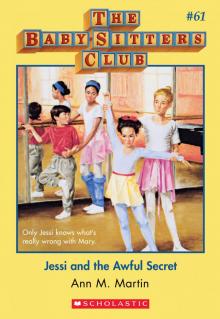 Jessi and the Awful Secret
Jessi and the Awful Secret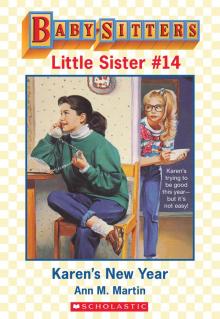 Karen's New Year
Karen's New Year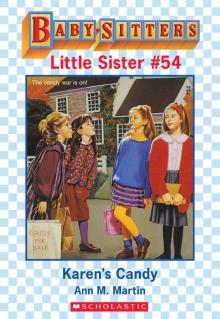 Karen's Candy
Karen's Candy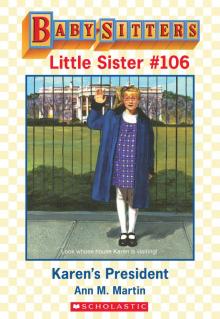 Karen's President
Karen's President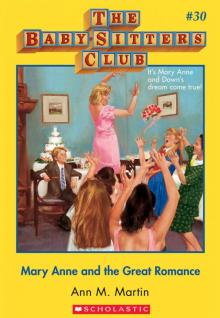 Mary Anne and the Great Romance
Mary Anne and the Great Romance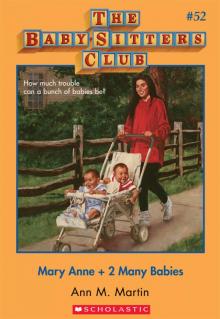 Mary Anne + 2 Many Babies
Mary Anne + 2 Many Babies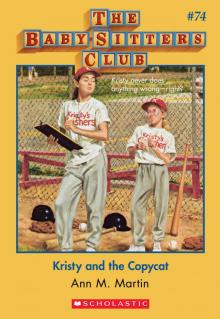 Kristy and the Copycat
Kristy and the Copycat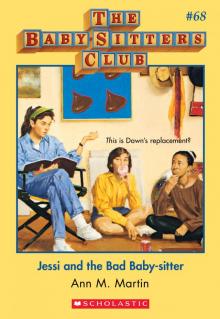 Jessi and the Bad Baby-Sitter
Jessi and the Bad Baby-Sitter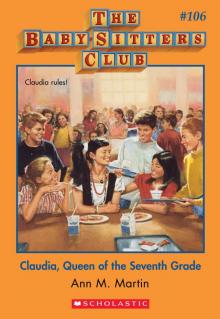 Claudia, Queen of the Seventh Grade
Claudia, Queen of the Seventh Grade Claudia and the Lighthouse Ghost
Claudia and the Lighthouse Ghost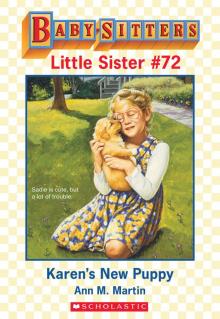 Karen's New Puppy
Karen's New Puppy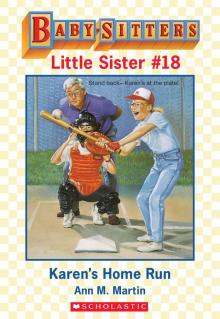 Karen's Home Run
Karen's Home Run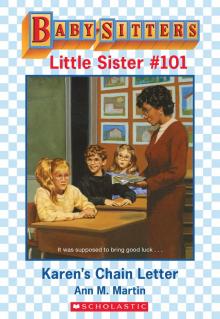 Karen's Chain Letter
Karen's Chain Letter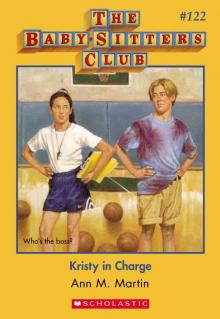 Kristy in Charge
Kristy in Charge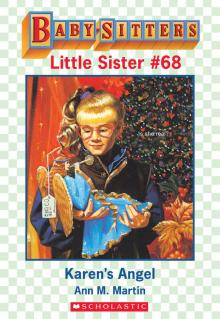 Karen's Angel
Karen's Angel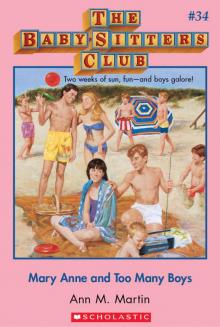 Mary Anne and Too Many Boys
Mary Anne and Too Many Boys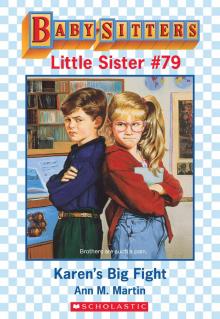 Karen's Big Fight
Karen's Big Fight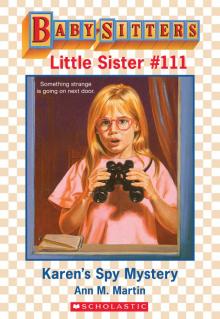 Karen's Spy Mystery
Karen's Spy Mystery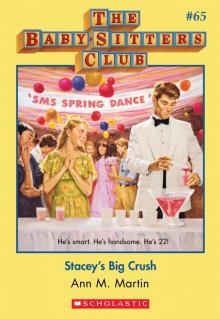 Stacey's Big Crush
Stacey's Big Crush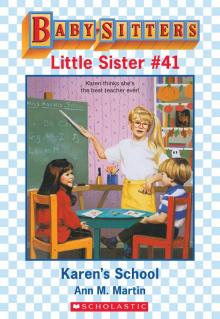 Karen's School
Karen's School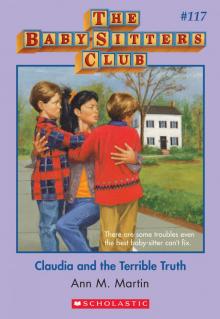 Claudia and the Terrible Truth
Claudia and the Terrible Truth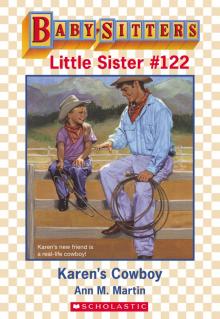 Karen's Cowboy
Karen's Cowboy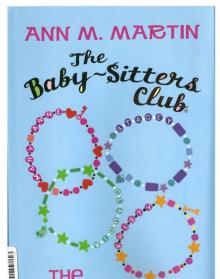 The Summer Before
The Summer Before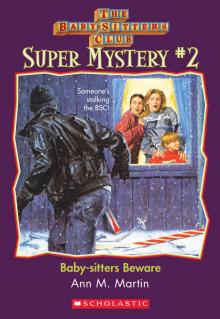 Beware, Dawn!
Beware, Dawn! Belle Teale
Belle Teale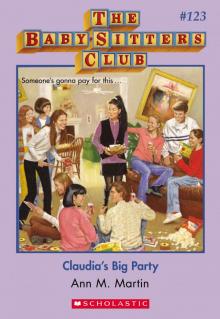 Claudia's Big Party
Claudia's Big Party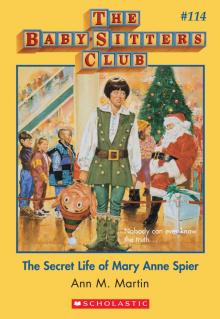 The Secret Life of Mary Anne Spier
The Secret Life of Mary Anne Spier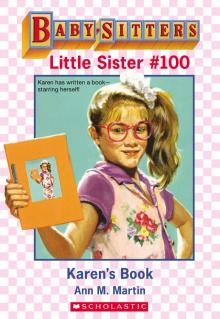 Karen's Book
Karen's Book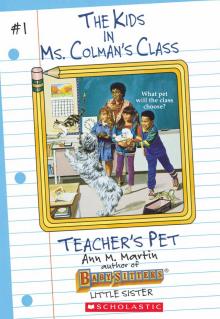 Teacher's Pet
Teacher's Pet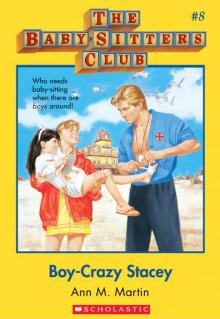 Boy-Crazy Stacey
Boy-Crazy Stacey Claudia and the Disaster Date
Claudia and the Disaster Date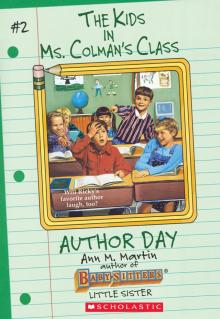 Author Day
Author Day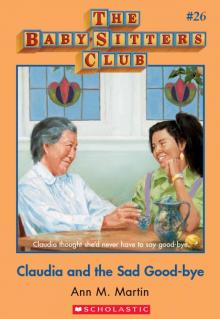 Claudia and the Sad Good-Bye
Claudia and the Sad Good-Bye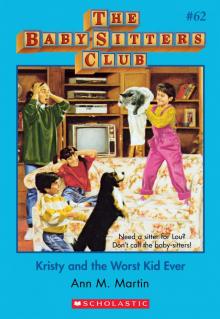 Kristy and the Worst Kid Ever
Kristy and the Worst Kid Ever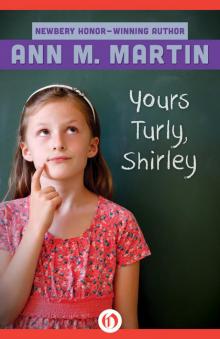 Yours Turly, Shirley
Yours Turly, Shirley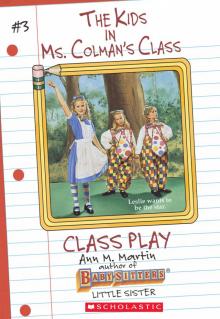 Class Play
Class Play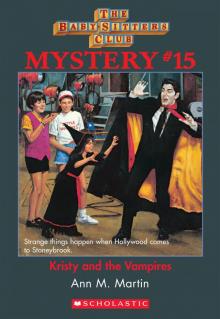 Kristy and the Vampires
Kristy and the Vampires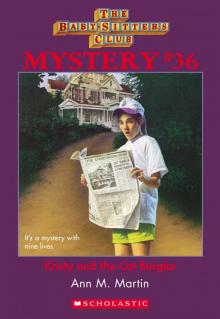 Kristy and the Cat Burglar
Kristy and the Cat Burglar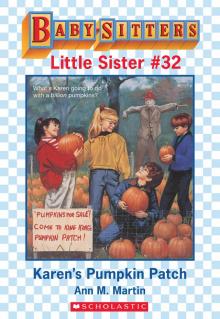 Karen's Pumpkin Patch
Karen's Pumpkin Patch Stacey and the Mystery at the Empty House
Stacey and the Mystery at the Empty House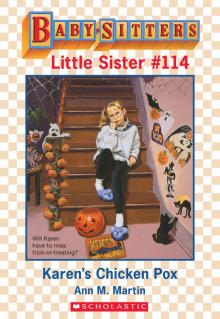 Karen's Chicken Pox
Karen's Chicken Pox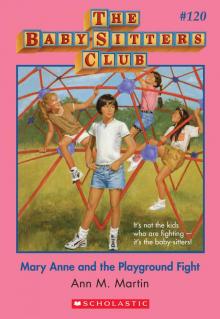 Mary Anne and the Playground Fight
Mary Anne and the Playground Fight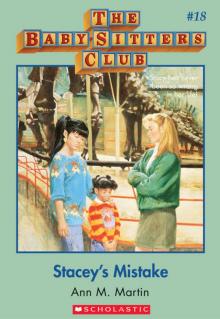 Stacey's Mistake
Stacey's Mistake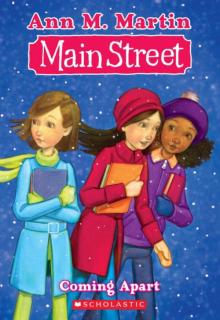 Coming Apart
Coming Apart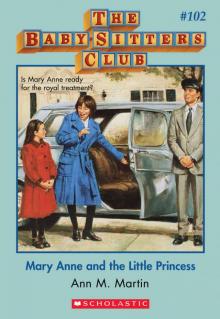 Mary Anne and the Little Princess
Mary Anne and the Little Princess Karen, Hannie and Nancy: The Three Musketeers
Karen, Hannie and Nancy: The Three Musketeers 'Tis the Season
'Tis the Season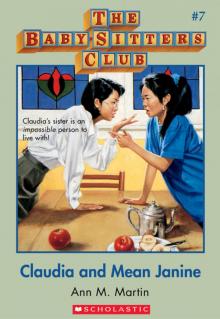 Claudia and Mean Janine
Claudia and Mean Janine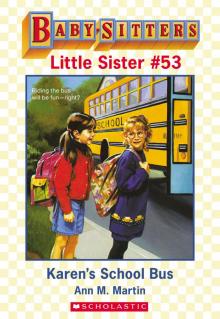 Karen's School Bus
Karen's School Bus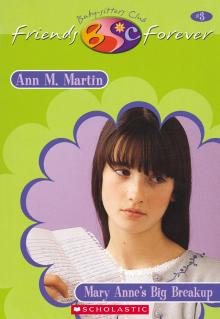 Mary Anne's Big Breakup
Mary Anne's Big Breakup Rain Reign
Rain Reign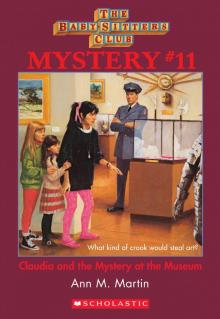 Claudia and the Mystery at the Museum
Claudia and the Mystery at the Museum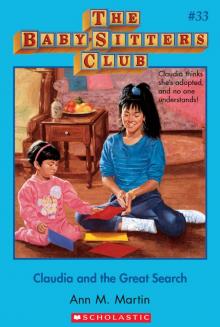 Claudia and the Great Search
Claudia and the Great Search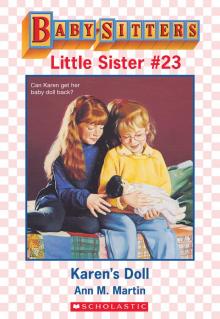 Karen's Doll
Karen's Doll Shannon's Story
Shannon's Story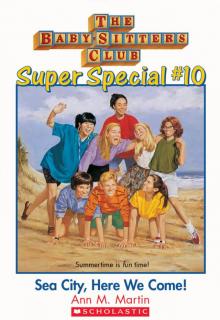 Sea City, Here We Come!
Sea City, Here We Come!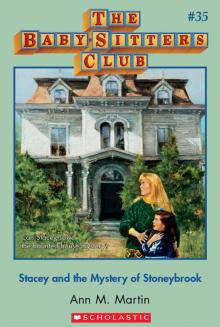 Stacey and the Mystery of Stoneybrook
Stacey and the Mystery of Stoneybrook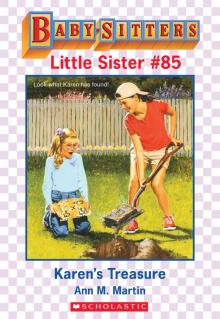 Karen's Treasure
Karen's Treasure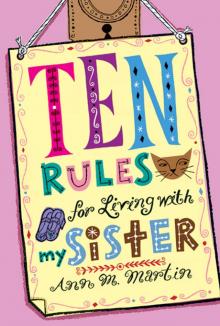 Ten Rules for Living With My Sister
Ten Rules for Living With My Sister With You and Without You
With You and Without You Baby-Sitters' Island Adventure
Baby-Sitters' Island Adventure Karen's Fishing Trip
Karen's Fishing Trip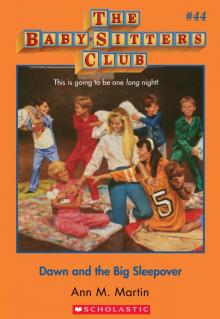 Dawn and the Big Sleepover
Dawn and the Big Sleepover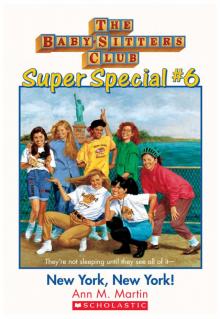 New York, New York!
New York, New York!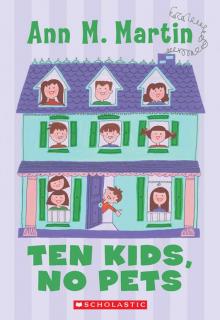 Ten Kids, No Pets
Ten Kids, No Pets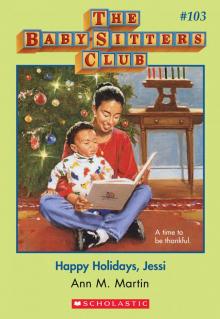 Happy Holidays, Jessi
Happy Holidays, Jessi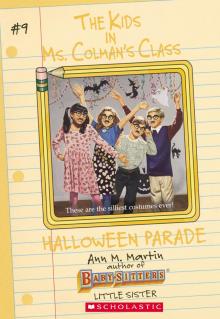 Halloween Parade
Halloween Parade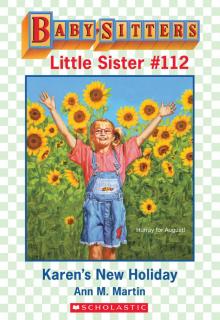 Karen's New Holiday
Karen's New Holiday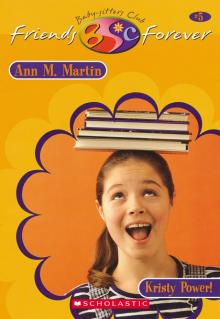 Kristy Power!
Kristy Power!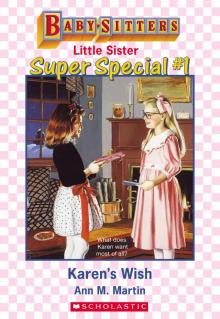 Karen's Wish
Karen's Wish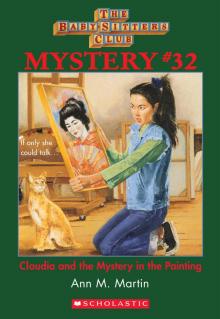 Claudia and the Mystery in the Painting
Claudia and the Mystery in the Painting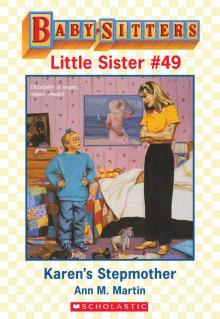 Karen's Stepmother
Karen's Stepmother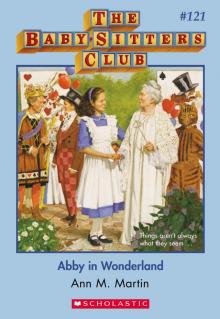 Abby in Wonderland
Abby in Wonderland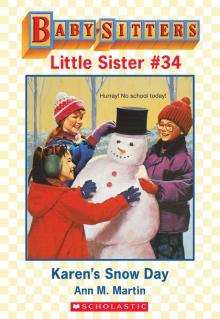 Karen's Snow Day
Karen's Snow Day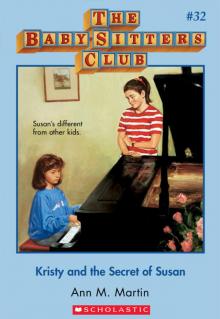 Kristy and the Secret of Susan
Kristy and the Secret of Susan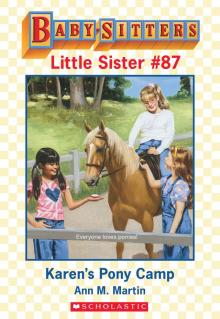 Karen's Pony Camp
Karen's Pony Camp Karen's School Trip
Karen's School Trip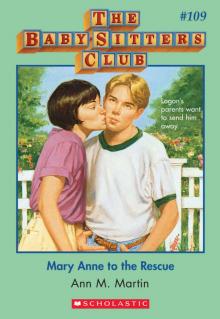 Mary Anne to the Rescue
Mary Anne to the Rescue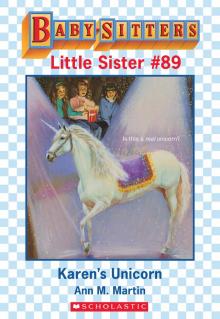 Karen's Unicorn
Karen's Unicorn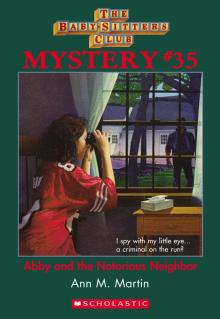 Abby and the Notorious Neighbor
Abby and the Notorious Neighbor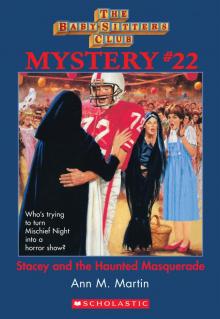 Stacey and the Haunted Masquerade
Stacey and the Haunted Masquerade Claudia Gets Her Guy
Claudia Gets Her Guy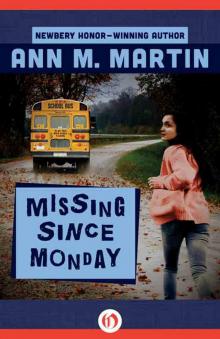 Missing Since Monday
Missing Since Monday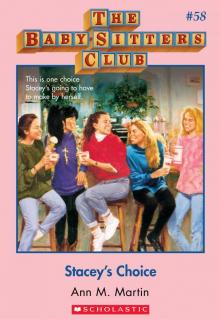 Stacey's Choice
Stacey's Choice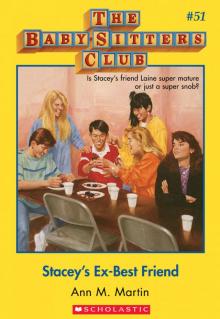 Stacey's Ex-Best Friend
Stacey's Ex-Best Friend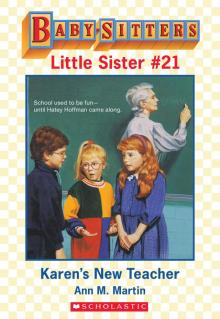 Karen's New Teacher
Karen's New Teacher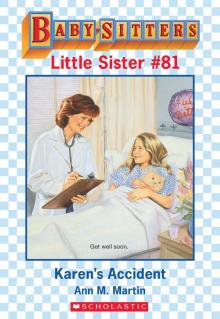 Karen's Accident
Karen's Accident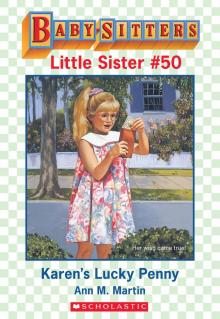 Karen's Lucky Penny
Karen's Lucky Penny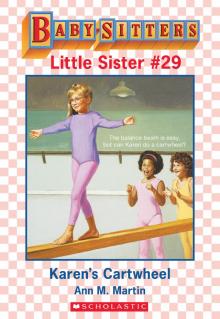 Karen's Cartwheel
Karen's Cartwheel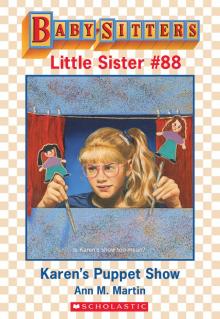 Karen's Puppet Show
Karen's Puppet Show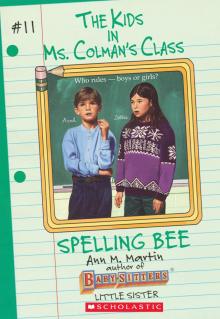 Spelling Bee
Spelling Bee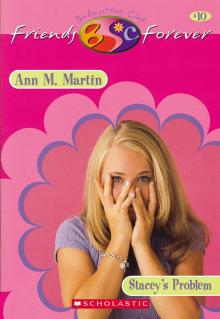 Stacey's Problem
Stacey's Problem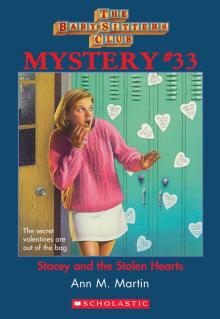 Stacey and the Stolen Hearts
Stacey and the Stolen Hearts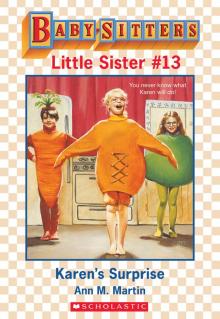 Karen's Surprise
Karen's Surprise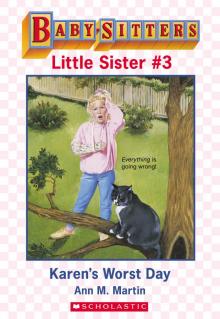 Karen's Worst Day
Karen's Worst Day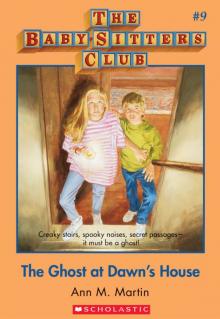 The Ghost at Dawn's House
The Ghost at Dawn's House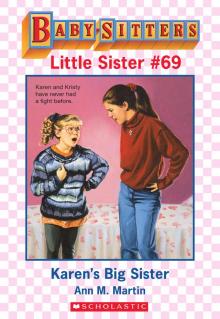 Karen's Big Sister
Karen's Big Sister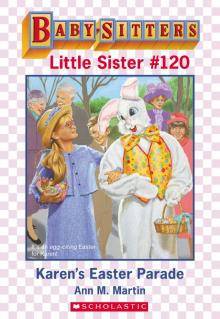 Karen's Easter Parade
Karen's Easter Parade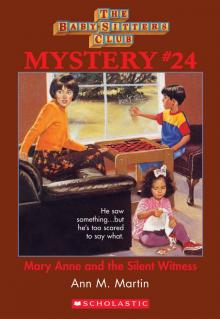 Mary Anne and the Silent Witness
Mary Anne and the Silent Witness Karen's Swim Meet
Karen's Swim Meet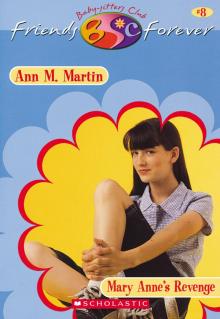 Mary Anne's Revenge
Mary Anne's Revenge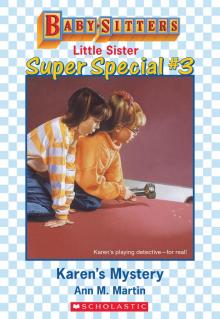 Karen's Mystery
Karen's Mystery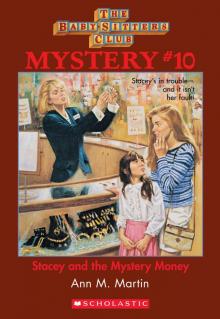 Stacey and the Mystery Money
Stacey and the Mystery Money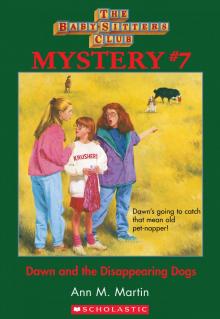 Dawn and the Disappearing Dogs
Dawn and the Disappearing Dogs Karen's Christmas Tree
Karen's Christmas Tree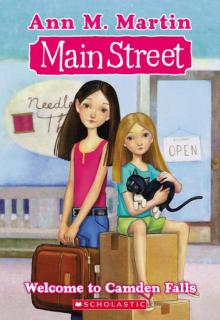 Welcome to Camden Falls
Welcome to Camden Falls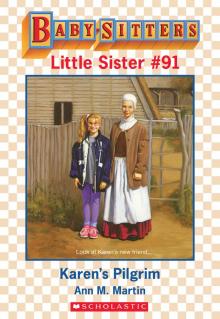 Karen's Pilgrim
Karen's Pilgrim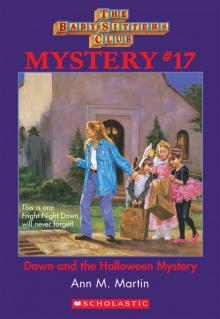 Dawn and the Halloween Mystery
Dawn and the Halloween Mystery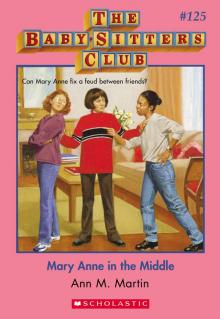 Mary Anne in the Middle
Mary Anne in the Middle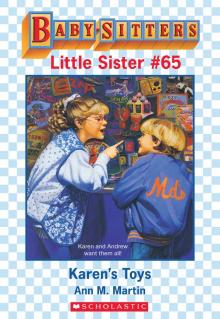 Karen's Toys
Karen's Toys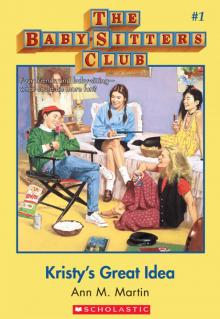 Kristy's Great Idea
Kristy's Great Idea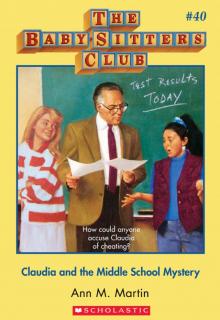 Claudia and the Middle School Mystery
Claudia and the Middle School Mystery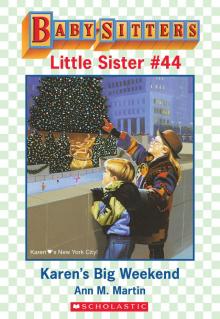 Karen's Big Weekend
Karen's Big Weekend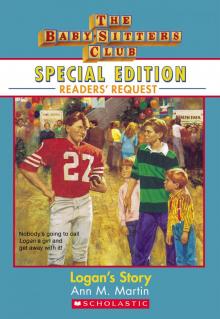 Logan's Story
Logan's Story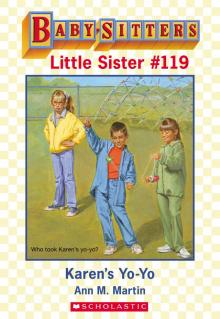 Karen's Yo-Yo
Karen's Yo-Yo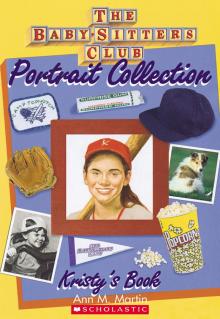 Kristy's Book
Kristy's Book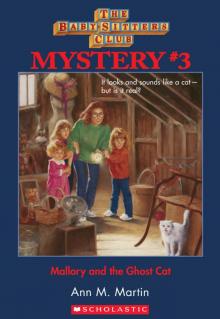 Mallory and the Ghost Cat
Mallory and the Ghost Cat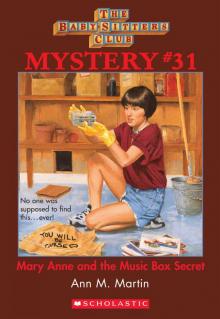 Mary Anne and the Music
Mary Anne and the Music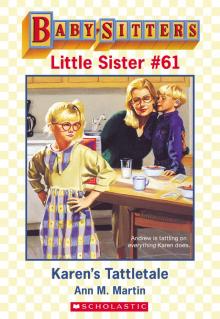 Karen's Tattletale
Karen's Tattletale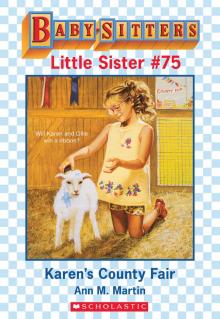 Karen's County Fair
Karen's County Fair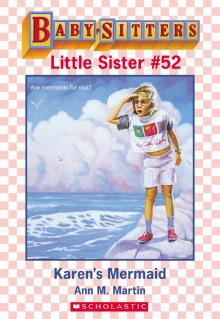 Karen's Mermaid
Karen's Mermaid Snowbound
Snowbound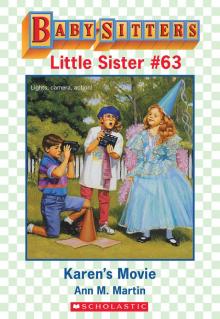 Karen's Movie
Karen's Movie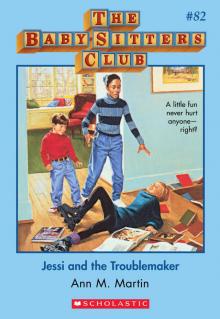 Jessi and the Troublemaker
Jessi and the Troublemaker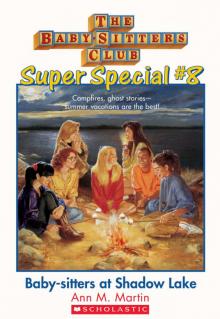 Baby-Sitters at Shadow Lake
Baby-Sitters at Shadow Lake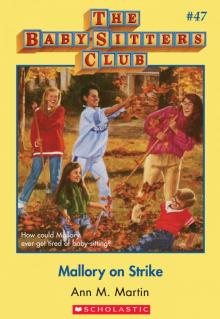 Mallory on Strike
Mallory on Strike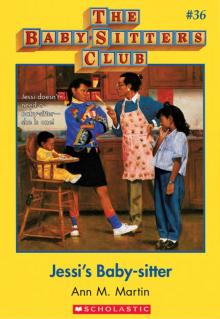 Jessi's Baby-Sitter
Jessi's Baby-Sitter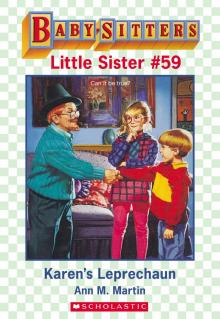 Karen's Leprechaun
Karen's Leprechaun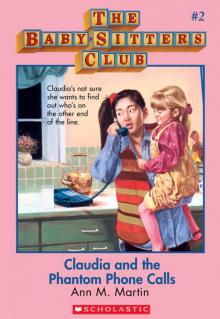 Claudia and the Phantom Phone Calls
Claudia and the Phantom Phone Calls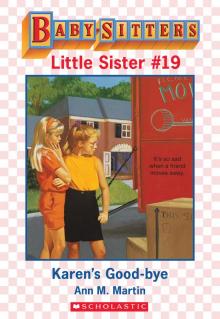 Karen's Good-Bye
Karen's Good-Bye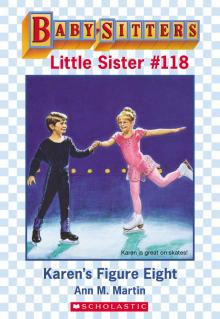 Karen's Figure Eight
Karen's Figure Eight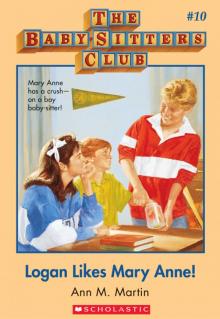 Logan Likes Mary Anne!
Logan Likes Mary Anne!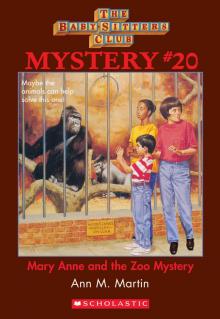 Mary Anne and the Zoo Mystery
Mary Anne and the Zoo Mystery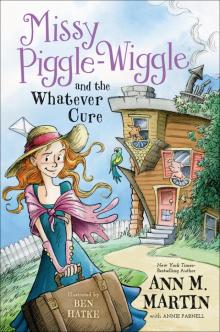 Missy Piggle-Wiggle and the Whatever Cure
Missy Piggle-Wiggle and the Whatever Cure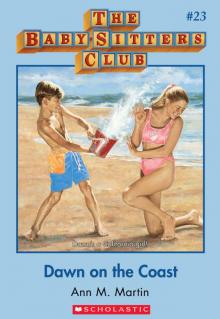 Dawn on the Coast
Dawn on the Coast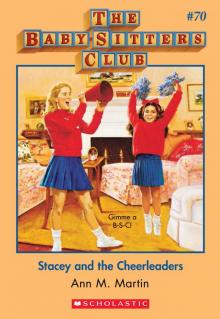 Stacey and the Cheerleaders
Stacey and the Cheerleaders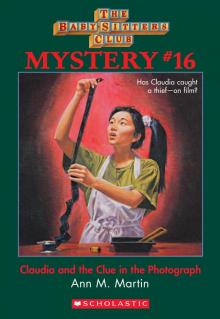 Claudia and the Clue in the Photograph
Claudia and the Clue in the Photograph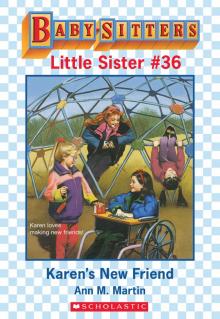 Karen's New Friend
Karen's New Friend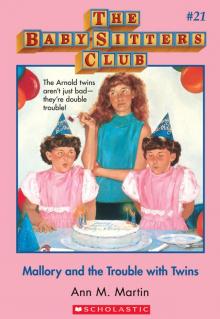 Mallory and the Trouble With Twins
Mallory and the Trouble With Twins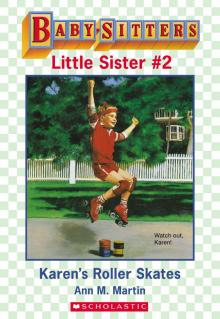 Karen's Roller Skates
Karen's Roller Skates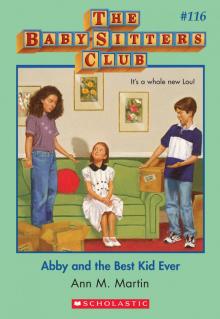 Abby and the Best Kid Ever
Abby and the Best Kid Ever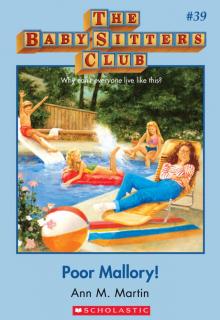 Poor Mallory!
Poor Mallory!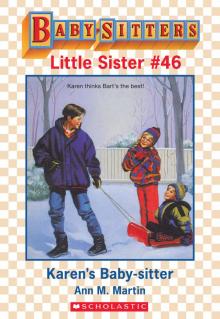 Karen's Witch
Karen's Witch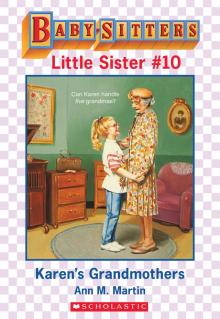 Karen's Grandmothers
Karen's Grandmothers Slam Book
Slam Book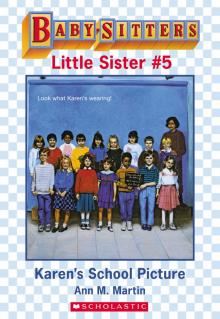 Karen's School Picture
Karen's School Picture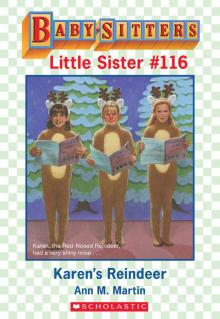 Karen's Reindeer
Karen's Reindeer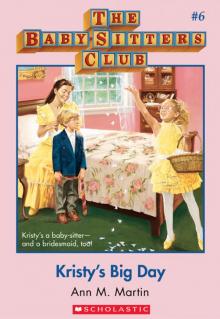 Kristy's Big Day
Kristy's Big Day The Long Way Home
The Long Way Home Karen's Sleigh Ride
Karen's Sleigh Ride On Christmas Eve
On Christmas Eve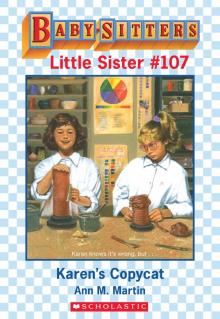 Karen's Copycat
Karen's Copycat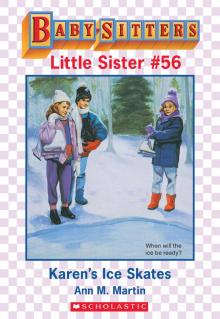 Karen's Ice Skates
Karen's Ice Skates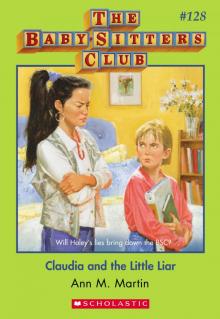 Claudia and the Little Liar
Claudia and the Little Liar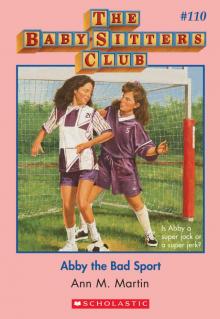 Abby the Bad Sport
Abby the Bad Sport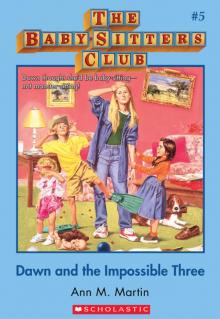 The Baby-Sitters Club #5: Dawn and the Impossible Three
The Baby-Sitters Club #5: Dawn and the Impossible Three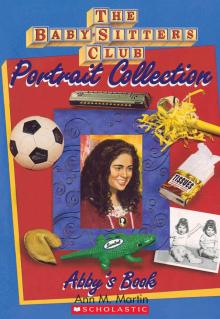 Abby's Book
Abby's Book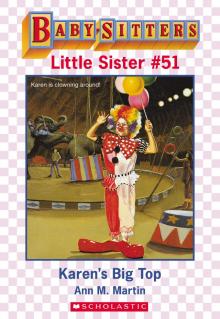 Karen's Big Top
Karen's Big Top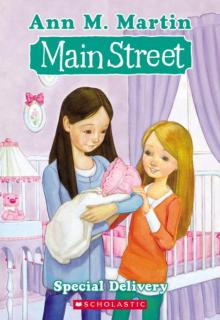 Main Street #8: Special Delivery
Main Street #8: Special Delivery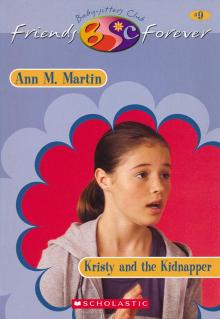 Kristy and the Kidnapper
Kristy and the Kidnapper Karen's Ski Trip
Karen's Ski Trip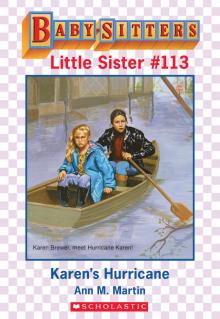 Karen's Hurricane
Karen's Hurricane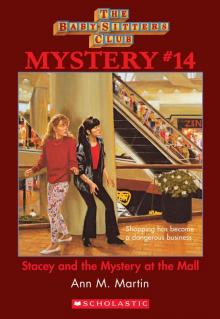 Stacey and the Mystery at the Mall
Stacey and the Mystery at the Mall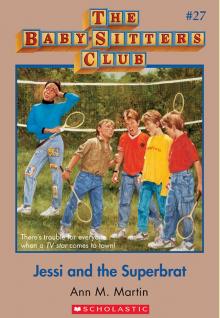 Jessi and the Superbrat
Jessi and the Superbrat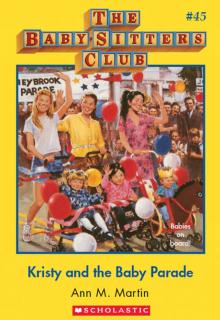 Kristy and the Baby Parade
Kristy and the Baby Parade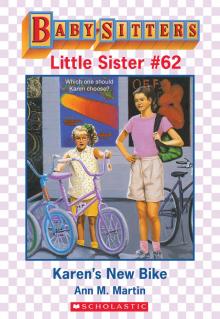 Karen's New Bike
Karen's New Bike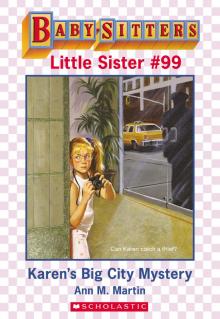 Karen's Big City Mystery
Karen's Big City Mystery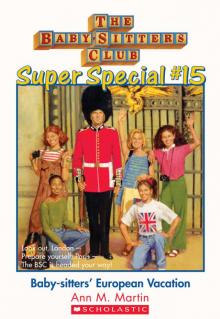 Baby-Sitters' European Vacation
Baby-Sitters' European Vacation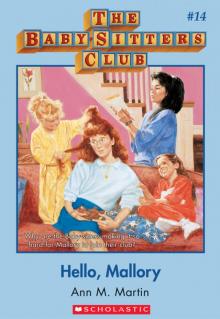 Hello, Mallory
Hello, Mallory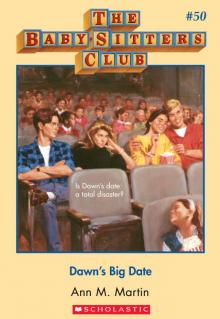 Dawn's Big Date
Dawn's Big Date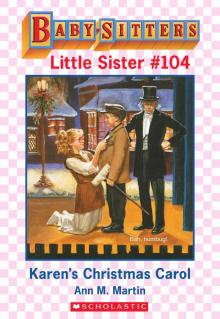 Karen's Christmas Carol
Karen's Christmas Carol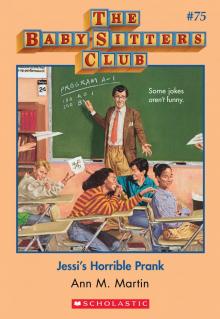 Jessi's Horrible Prank
Jessi's Horrible Prank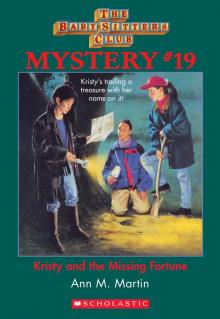 Kristy and the Missing Fortune
Kristy and the Missing Fortune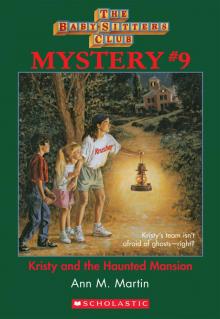 Kristy and the Haunted Mansion
Kristy and the Haunted Mansion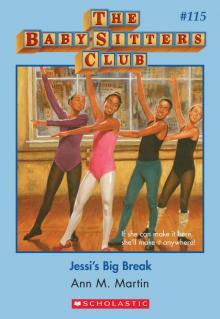 Jessi's Big Break
Jessi's Big Break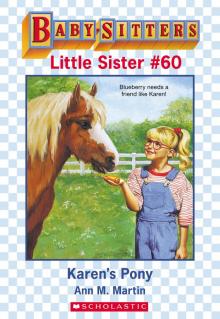 Karen's Pony
Karen's Pony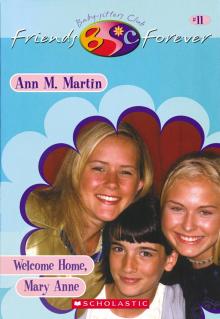 Welcome Home, Mary Anne
Welcome Home, Mary Anne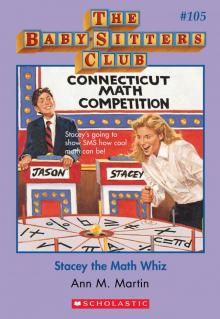 Stacey the Math Whiz
Stacey the Math Whiz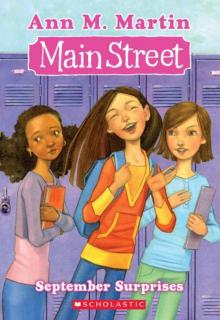 September Surprises
September Surprises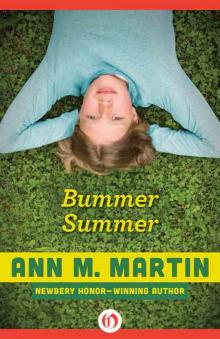 Bummer Summer
Bummer Summer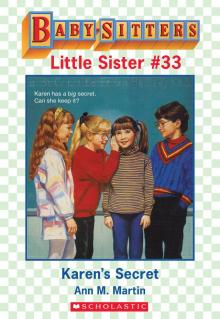 Karen's Secret
Karen's Secret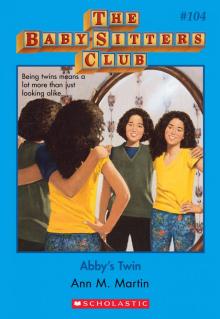 Abby's Twin
Abby's Twin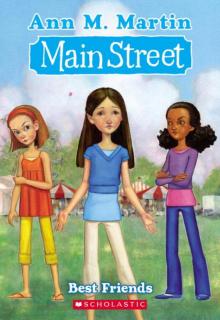 Main Street #4: Best Friends
Main Street #4: Best Friends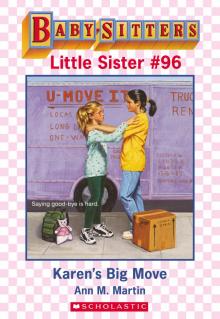 Karen's Big Move
Karen's Big Move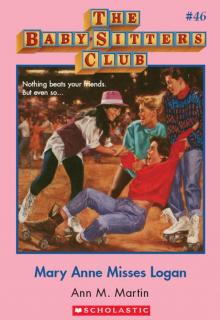 Mary Anne Misses Logan
Mary Anne Misses Logan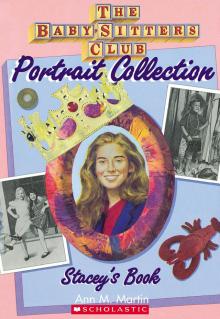 Stacey's Book
Stacey's Book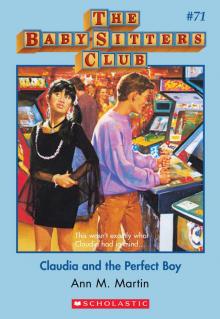 Claudia and the Perfect Boy
Claudia and the Perfect Boy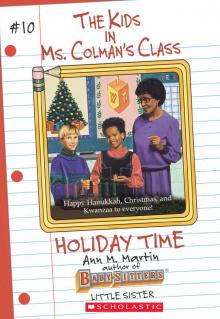 Holiday Time
Holiday Time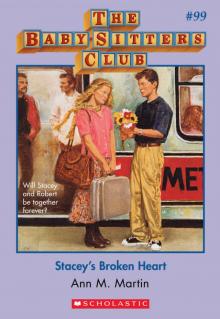 Stacey's Broken Heart
Stacey's Broken Heart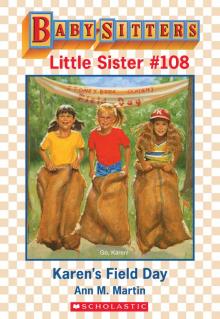 Karen's Field Day
Karen's Field Day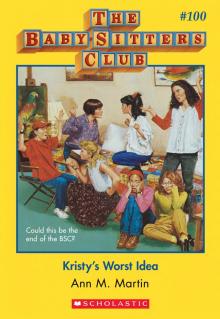 Kristy's Worst Idea
Kristy's Worst Idea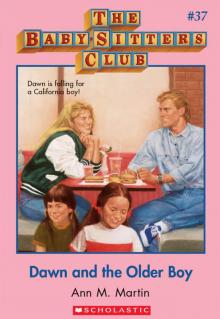 Dawn and the Older Boy
Dawn and the Older Boy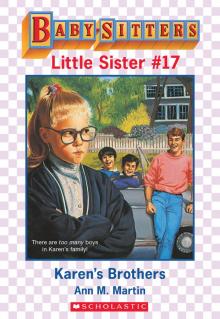 Karen's Brothers
Karen's Brothers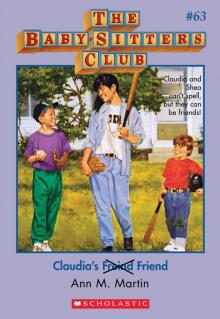 Claudia's Friend
Claudia's Friend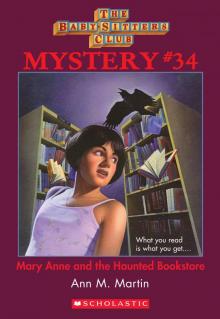 Mary Anne and the Haunted Bookstore
Mary Anne and the Haunted Bookstore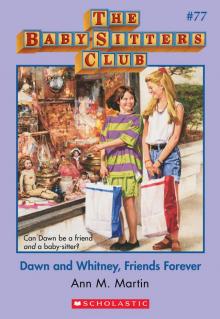 Dawn and Whitney, Friends Forever
Dawn and Whitney, Friends Forever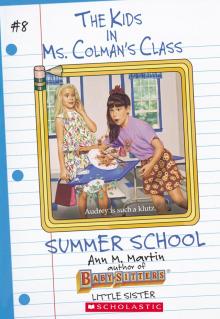 Summer School
Summer School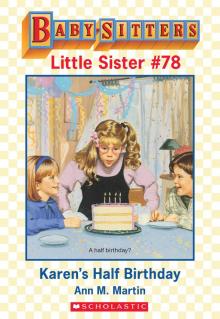 Karen's Birthday
Karen's Birthday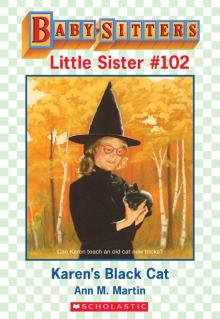 Karen's Black Cat
Karen's Black Cat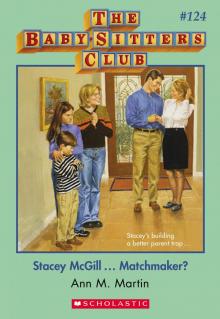 Stacey McGill... Matchmaker?
Stacey McGill... Matchmaker?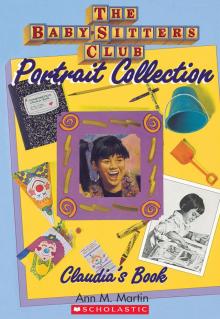 Claudia's Book
Claudia's Book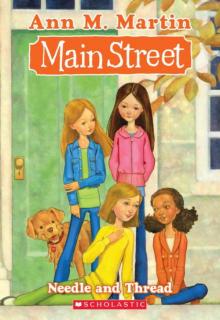 Main Street #2: Needle and Thread
Main Street #2: Needle and Thread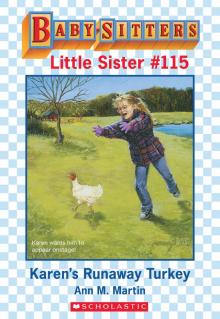 Karen's Runaway Turkey
Karen's Runaway Turkey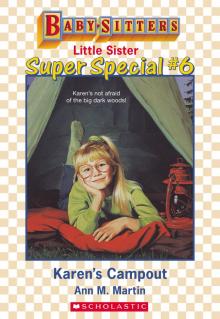 Karen's Campout
Karen's Campout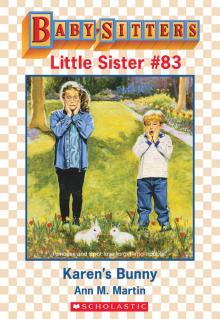 Karen's Bunny
Karen's Bunny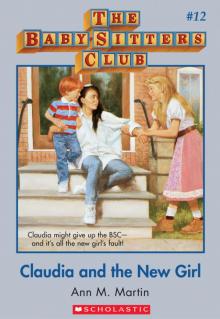 Claudia and the New Girl
Claudia and the New Girl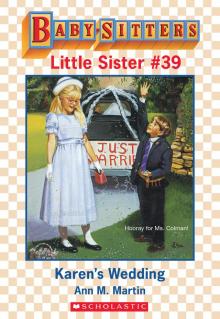 Karen's Wedding
Karen's Wedding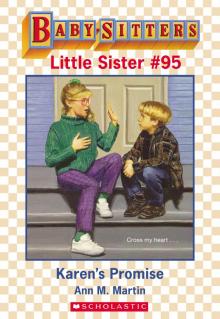 Karen's Promise
Karen's Promise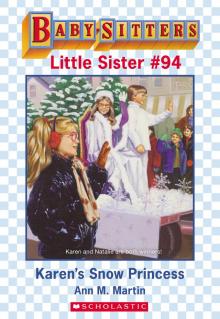 Karen's Snow Princess
Karen's Snow Princess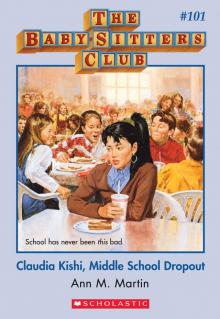 Claudia Kishi, Middle School Dropout
Claudia Kishi, Middle School Dropout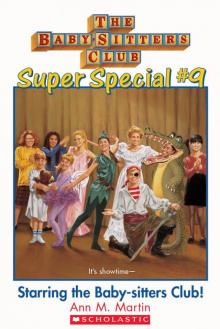 Starring the Baby-Sitters Club!
Starring the Baby-Sitters Club!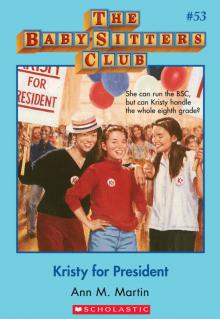 Kristy for President
Kristy for President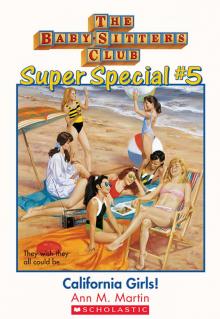 California Girls!
California Girls!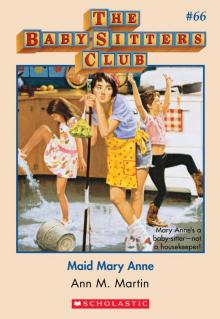 Maid Mary Anne
Maid Mary Anne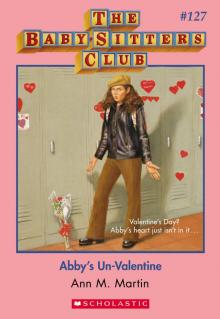 Abby's Un-Valentine
Abby's Un-Valentine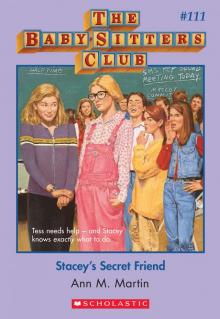 Stacey's Secret Friend
Stacey's Secret Friend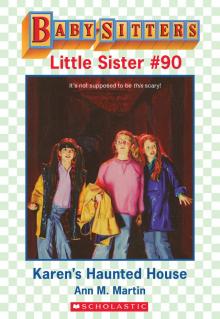 Karen's Haunted House
Karen's Haunted House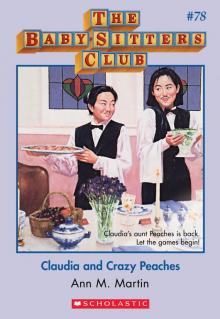 Claudia and Crazy Peaches
Claudia and Crazy Peaches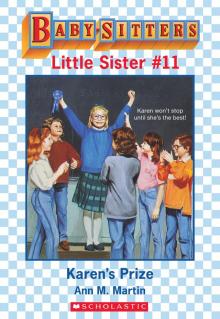 Karen's Prize
Karen's Prize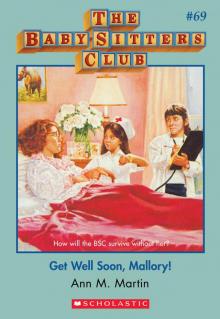 Get Well Soon, Mallory!
Get Well Soon, Mallory!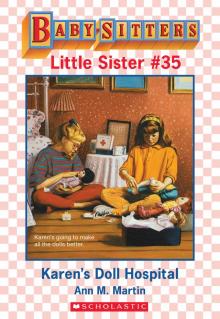 Karen's Doll Hospital
Karen's Doll Hospital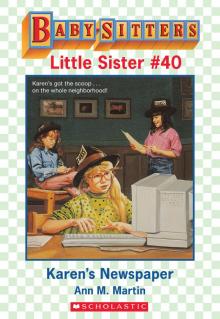 Karen's Newspaper
Karen's Newspaper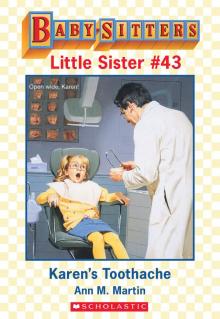 Karen's Toothache
Karen's Toothache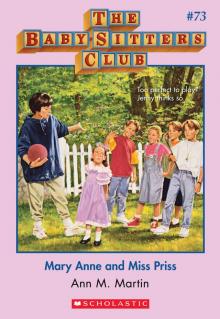 Mary Anne and Miss Priss
Mary Anne and Miss Priss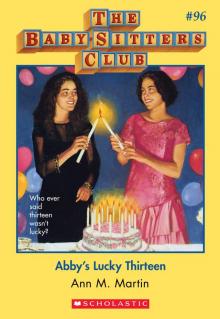 Abby's Lucky Thirteen
Abby's Lucky Thirteen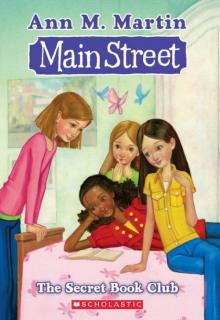 The Secret Book Club
The Secret Book Club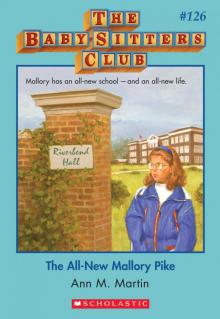 The All-New Mallory Pike
The All-New Mallory Pike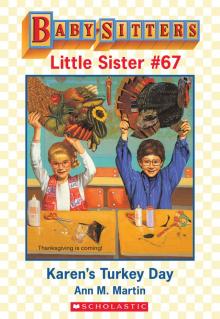 Karen's Turkey Day
Karen's Turkey Day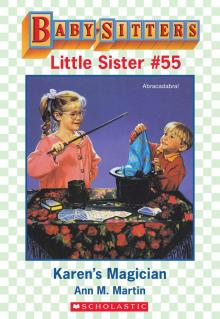 Karen's Magician
Karen's Magician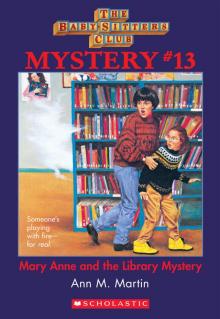 Mary Anne and the Library Mystery
Mary Anne and the Library Mystery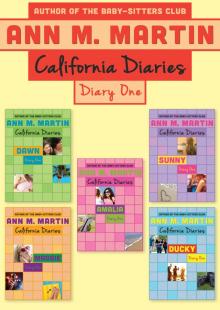 Diary One: Dawn, Sunny, Maggie, Amalia, and Ducky
Diary One: Dawn, Sunny, Maggie, Amalia, and Ducky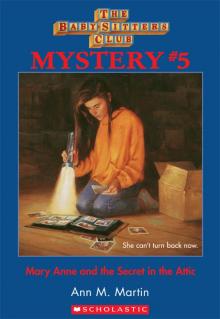 Mary Anne and the Secret in the Attic
Mary Anne and the Secret in the Attic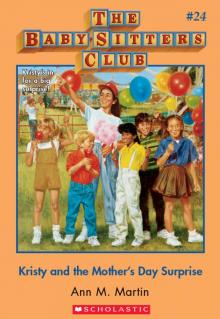 Kristy and the Mother's Day Surprise
Kristy and the Mother's Day Surprise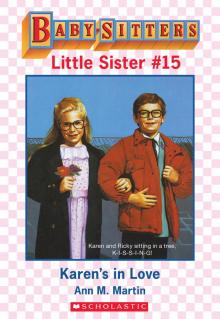 Karen's in Love
Karen's in Love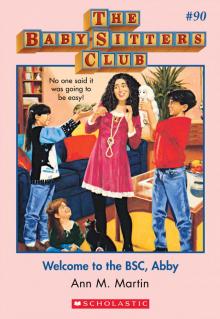 Welcome to the BSC, Abby
Welcome to the BSC, Abby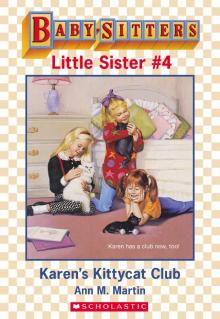 Karen's Kittycat Club
Karen's Kittycat Club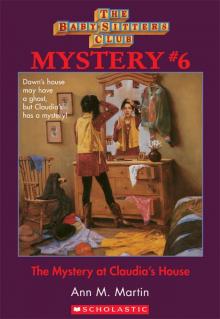 The Mystery at Claudia's House
The Mystery at Claudia's House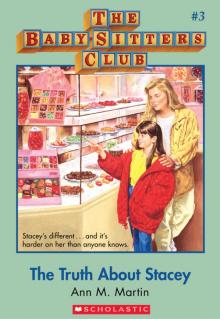 The Truth About Stacey
The Truth About Stacey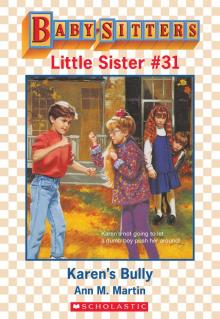 Karen's Bully
Karen's Bully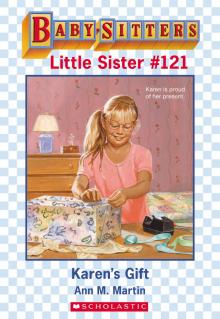 Karen's Gift
Karen's Gift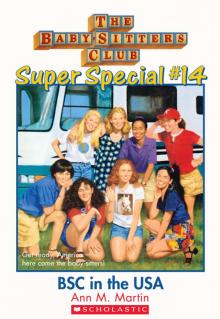 BSC in the USA
BSC in the USA Everything for a Dog
Everything for a Dog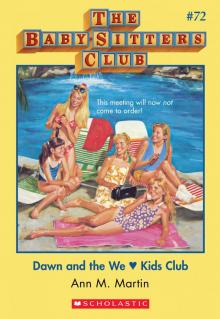 Dawn and the We Love Kids Club
Dawn and the We Love Kids Club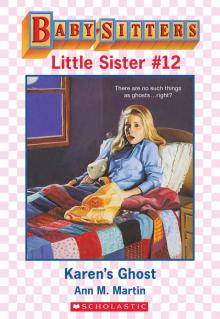 Karen's Ghost
Karen's Ghost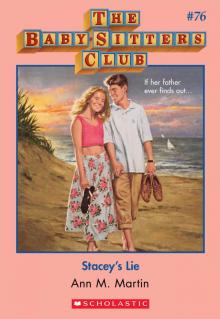 Stacey's Lie
Stacey's Lie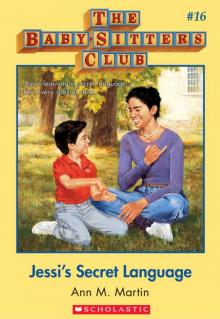 Jessi's Secret Language
Jessi's Secret Language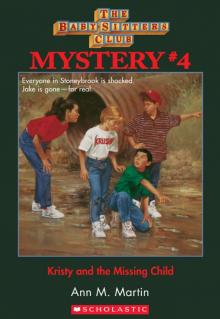 Kristy and the Missing Child
Kristy and the Missing Child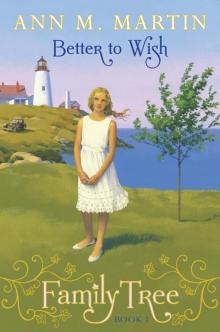 Better to Wish
Better to Wish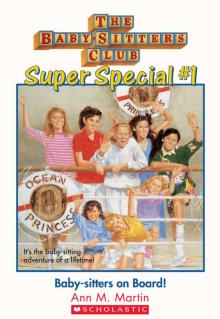 Baby-Sitters on Board!
Baby-Sitters on Board!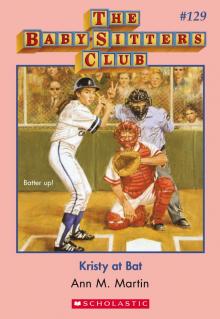 Kristy at Bat
Kristy at Bat Everything Changes
Everything Changes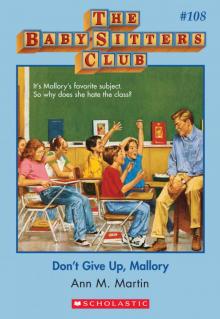 Don't Give Up, Mallory
Don't Give Up, Mallory A Dog's Life: The Autobiography of a Stray
A Dog's Life: The Autobiography of a Stray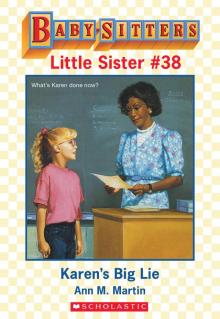 Karen's Big Lie
Karen's Big Lie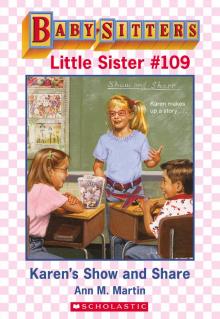 Karen's Show and Share
Karen's Show and Share Mallory Hates Boys (and Gym)
Mallory Hates Boys (and Gym)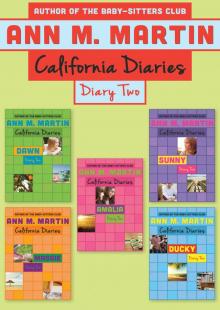 Diary Two: Dawn, Sunny, Maggie, Amalia, and Ducky
Diary Two: Dawn, Sunny, Maggie, Amalia, and Ducky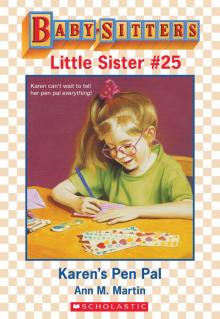 Karen's Pen Pal
Karen's Pen Pal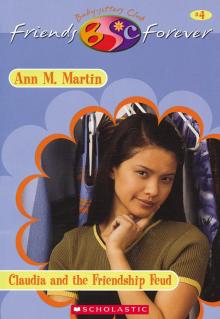 Claudia and the Friendship Feud
Claudia and the Friendship Feud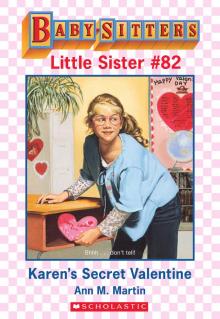 Karen's Secret Valentine
Karen's Secret Valentine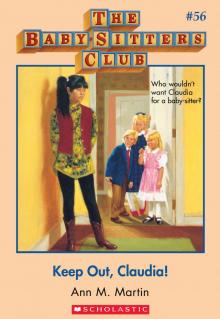 Keep Out, Claudia!
Keep Out, Claudia! Aloha, Baby-Sitters!
Aloha, Baby-Sitters!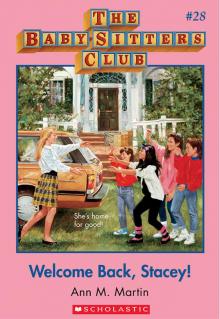 Welcome Back, Stacey
Welcome Back, Stacey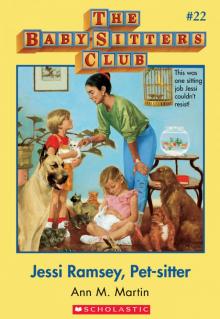 Jessi Ramsey, Pet-Sitter
Jessi Ramsey, Pet-Sitter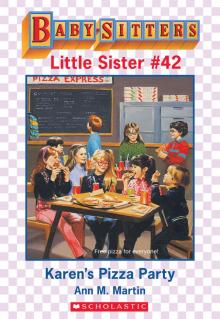 Karen's Pizza Party
Karen's Pizza Party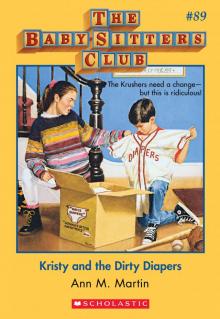 Kristy and the Dirty Diapers
Kristy and the Dirty Diapers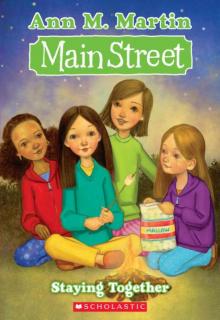 Staying Together
Staying Together Dawn and the Surfer Ghost
Dawn and the Surfer Ghost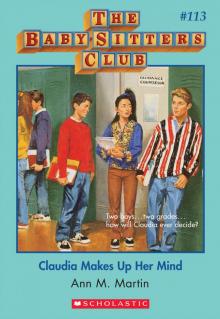 Claudia Makes Up Her Mind
Claudia Makes Up Her Mind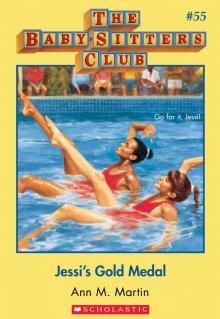 Jessi's Gold Medal
Jessi's Gold Medal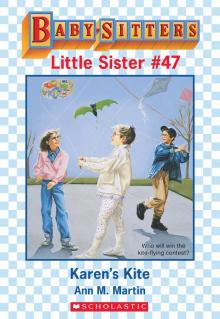 Karen's Kite
Karen's Kite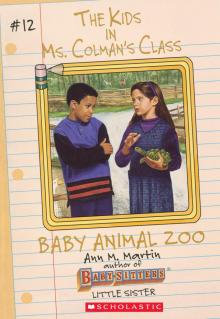 Baby Animal Zoo
Baby Animal Zoo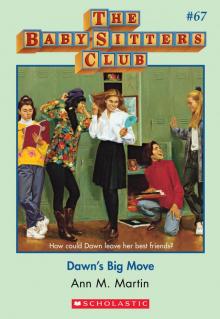 Dawn's Big Move
Dawn's Big Move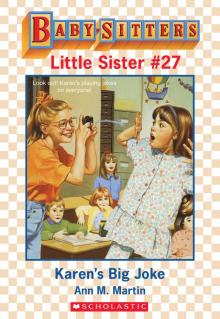 Karen's Big Joke
Karen's Big Joke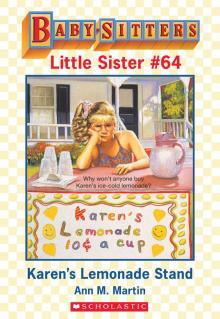 Karen's Lemonade Stand
Karen's Lemonade Stand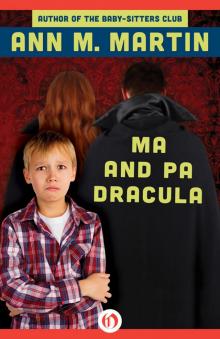 Ma and Pa Dracula
Ma and Pa Dracula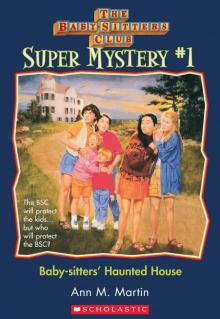 Baby-Sitters' Haunted House
Baby-Sitters' Haunted House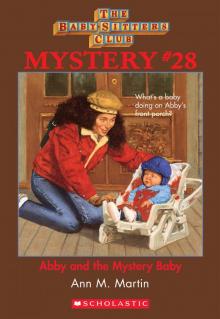 Abby and the Mystery Baby
Abby and the Mystery Baby Home Is the Place
Home Is the Place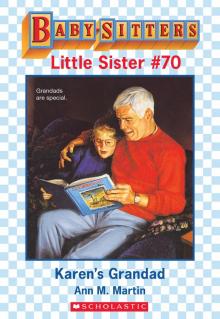 Karen's Grandad
Karen's Grandad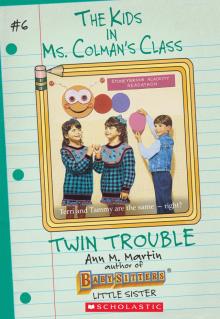 Twin Trouble
Twin Trouble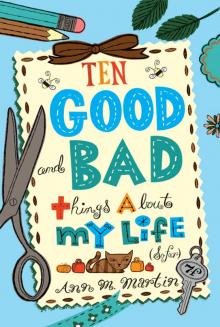 Ten Good and Bad Things About My Life (So Far)
Ten Good and Bad Things About My Life (So Far)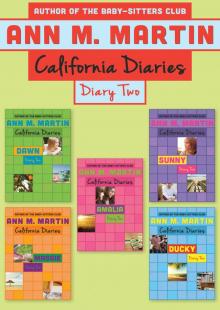 Diary Two
Diary Two Baby-Sitters Club 027
Baby-Sitters Club 027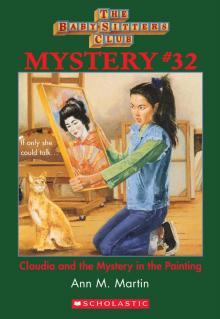 Claudia and the Mystery Painting
Claudia and the Mystery Painting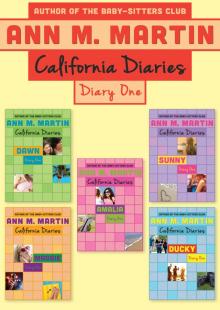 Diary One
Diary One Baby-Sitters Club 037
Baby-Sitters Club 037 Baby-Sitters Club 028
Baby-Sitters Club 028 Baby-Sitters Club 085
Baby-Sitters Club 085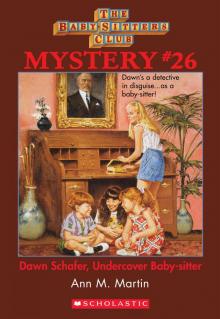 Dawn Schaffer Undercover Baby-Sitter
Dawn Schaffer Undercover Baby-Sitter Jessi's Babysitter
Jessi's Babysitter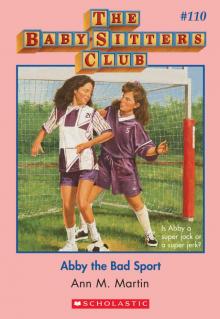 The Baby-Sitters Club #110: Abby the Bad Sport (Baby-Sitters Club, The)
The Baby-Sitters Club #110: Abby the Bad Sport (Baby-Sitters Club, The) Karen's Little Sister
Karen's Little Sister Baby-Sitters Club 058
Baby-Sitters Club 058 Claudia And The Genius On Elm St.
Claudia And The Genius On Elm St. Missy Piggle-Wiggle and the Sticky-Fingers Cure
Missy Piggle-Wiggle and the Sticky-Fingers Cure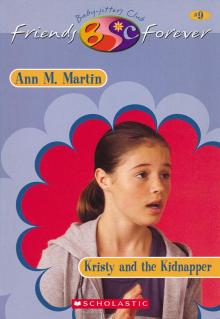 Kristy and Kidnapper
Kristy and Kidnapper Baby-Sitters Club 041
Baby-Sitters Club 041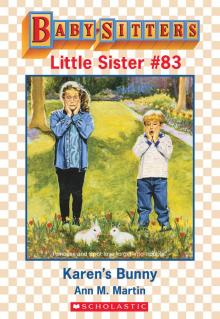 Karen's Bunny Trouble
Karen's Bunny Trouble Baby-Sitters Club 032
Baby-Sitters Club 032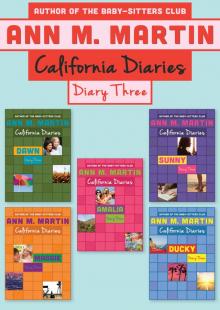 Diary Three
Diary Three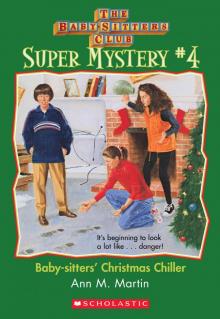 Christmas Chiller
Christmas Chiller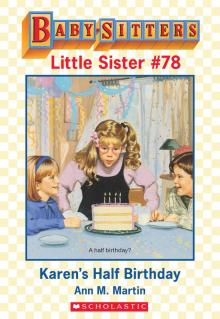 Karen's Half-Birthday
Karen's Half-Birthday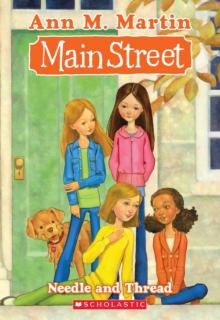 Needle and Thread
Needle and Thread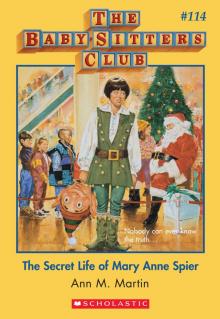 Secret Life of Mary Anne Spier
Secret Life of Mary Anne Spier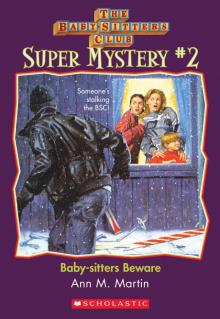 Baby-Sitters Beware
Baby-Sitters Beware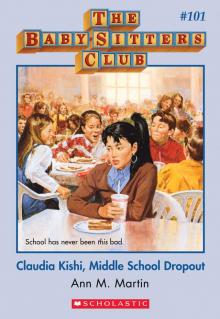 Claudia Kishi, Middle School Drop-Out
Claudia Kishi, Middle School Drop-Out Logan Likes Mary Anne !
Logan Likes Mary Anne ! Baby-Sitters Club 061
Baby-Sitters Club 061 Best Friends
Best Friends Baby-Sitters Club 031
Baby-Sitters Club 031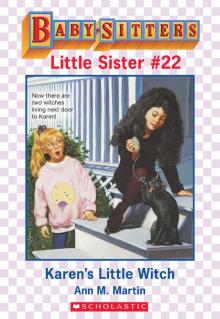 Karen's Little Witch
Karen's Little Witch Jessi Ramsey, Petsitter
Jessi Ramsey, Petsitter Baby-Sitters Club 123
Baby-Sitters Club 123 Baby-Sitters Club 059
Baby-Sitters Club 059 Baby-Sitters Club 033
Baby-Sitters Club 033 Baby-Sitters Club 060
Baby-Sitters Club 060 Baby-Sitters Club 094
Baby-Sitters Club 094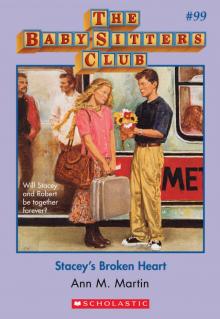 The Baby-Sitters Club #99: Stacey's Broken Heart
The Baby-Sitters Club #99: Stacey's Broken Heart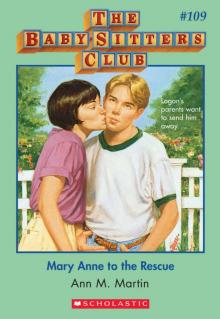 The Baby-Sitters Club #109: Mary Anne to the Rescue (Baby-Sitters Club, The)
The Baby-Sitters Club #109: Mary Anne to the Rescue (Baby-Sitters Club, The) Mystery At Claudia's House
Mystery At Claudia's House Claudia And The Sad Goodbye
Claudia And The Sad Goodbye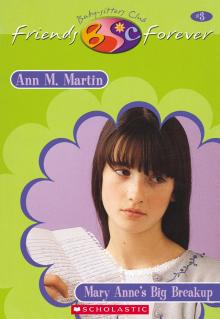 Mary Anne's Big Break-Up
Mary Anne's Big Break-Up Baby-Sitters Club 025
Baby-Sitters Club 025 Baby-Sitters Club 042
Baby-Sitters Club 042 Stacey and the Mystery of the Empty House
Stacey and the Mystery of the Empty House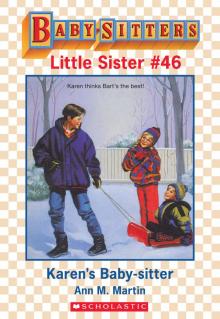 Karen's Baby-Sitter
Karen's Baby-Sitter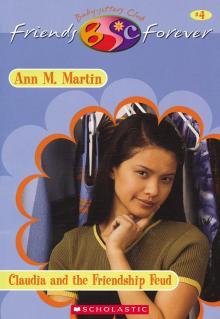 Claudia's Friendship Feud
Claudia's Friendship Feud Baby-Sitters Club 090
Baby-Sitters Club 090 Baby-Sitters Club 021
Baby-Sitters Club 021 Baby-Sitters Club 056
Baby-Sitters Club 056 Baby-Sitters Club 040
Baby-Sitters Club 040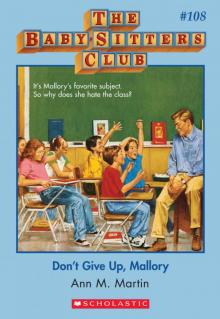 The Baby-Sitters Club #108: Don't Give Up, Mallory (Baby-Sitters Club, The)
The Baby-Sitters Club #108: Don't Give Up, Mallory (Baby-Sitters Club, The)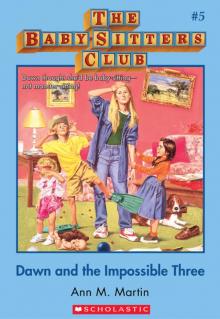 Dawn and the Impossible Three
Dawn and the Impossible Three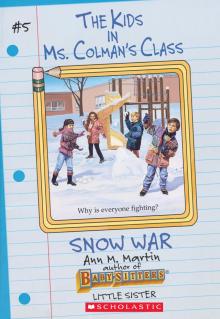 The Snow War
The Snow War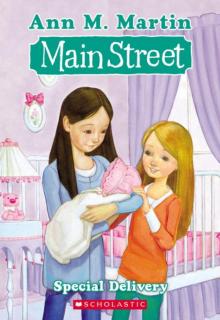 Special Delivery
Special Delivery Baby-Sitters Club 057
Baby-Sitters Club 057 Mary Anne And Too Many Babies
Mary Anne And Too Many Babies Baby-Sitters Club 030
Baby-Sitters Club 030